& Features In This Issue

ADVOCACY. SERVICE. INNOVATION. September/October 2022
Columns
ON THE COVER: Suwanee’s Glow in the Park Among Georgia Downtown Association Honorees Managing Work-Life Balance in Office | Uniting Cites Through Placemaking | Smith: Literacy Key to Cities’ Futures
CPS

CUSTOMERS
RETURNING FOR
OUR RETURN
YOU WILL RETURN.
CPS
HAVE BEEN
MORE THAN 60 YEARS.
POLICY IS SIMPLE.
customers have been returning for more than 60 years. From our advanced metering systems and coatings capabilities to our new ERP system designed specifically with you, our customer, in mind we are continually adjusting our business to address the needs of yours.
Serving industry with pipes, fittings, and valves for more than 60 years. CONTACT US TODAY. CONSOLIDATEDPIPE.COM QUALITYSINCE1960
September/October 2022 Volume 1 • No. 20

Editorial and Advertising Offices: 201 Pryor Street, SW Atlanta, GA 30303
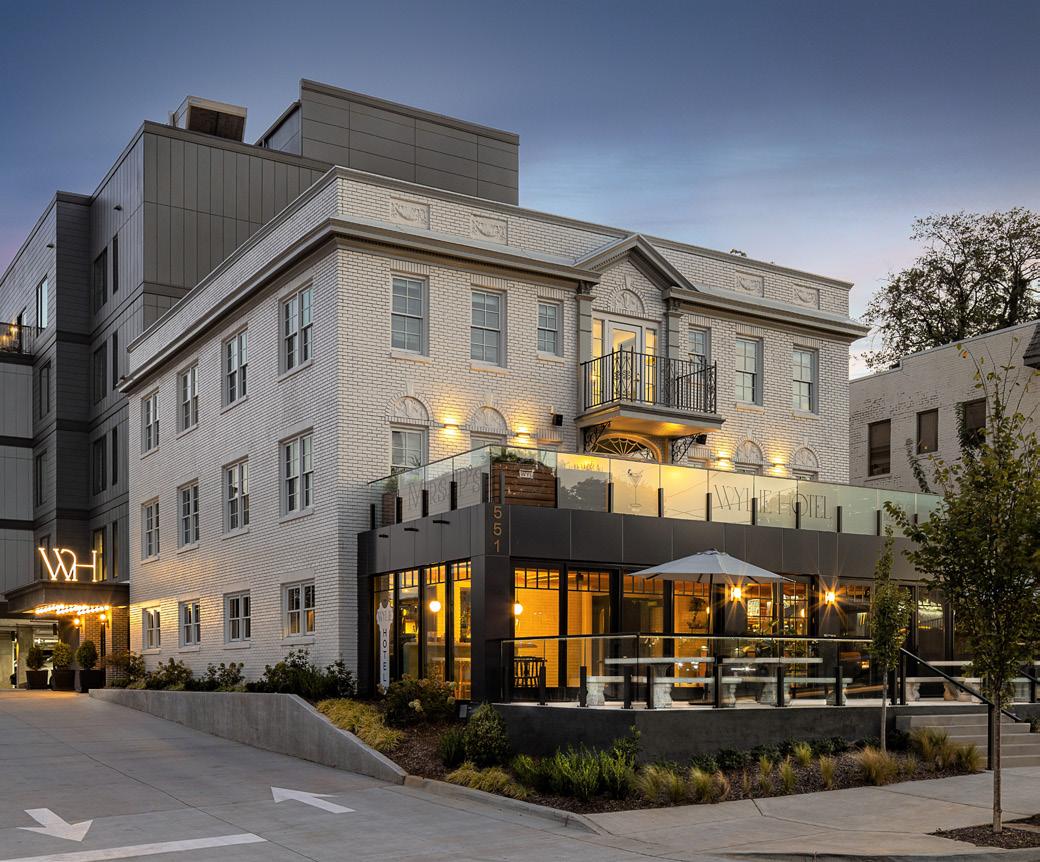
Phone: 404.688.0472
Fax: 678.686.6289 E-mail: gacities@gacities.com
CEO AND EXECUTIVE DIRECTOR
Larry Hanson
PUBLISHER
Amanda Coyne GRAPHIC ARTIST
Lindsay Podrid
ADVERTISING SALES
Lynne Norton
EDITORIAL BOARD
Emily Davenport
Alan Dickerson
Cindy Eidson
Dana Goodall
Latisha Gray
Gwin Hall
Aileen Harris
Chris Higdon Kay Love
Chris Obenschain
Rusi Patel Noah Roenitz
Kristian Serrano
Becky Taylor Monica Thornton Brian Wallace
GMA OFFICERS
President: Tifton Mayor Julie Smith
First Vice President: Perry Mayor Randall Walker
Second Vice President: Madison Mayor Fred Perriman
Third Vice President: College Park Mayor Bianca Motley Broom
Immediate Past President: LaGrange Mayor Jim Thornton
Subscription $36.00 per year.
Single copies $4.00.
Advertising rates upon request.
Approximately 7,000 copies of this issue printed.
Our policy is to distribute Georgia’s Cities to Mayors, City Councils, City Managers and other key City Officials. Georgia’s Cities reserves the right to decline advertising it deems unsuitable for its audience or market.

Designing and Building the Future for our Clients, Colleagues, and Communities. www.ssoe.com

ARCHITECTURE ENGINEERING INTERIOR DESIGN MASTER PLANNING HISTORIC PRESERVATION ADAPTIVE REUSE
Wylie Hotel Atlanta, Georgia
Table of Contents
FEATURES
GEORGIA DOWNTOWN CONFERENCE RECAP AND AWARDS SUMMARY ........ 5
HOW TO MANAGE YOUR WORK-LIFE BALANCE AS A NEWLY ELECTED OFFICIAL ...................................................................... 10 CITIES CREATE COMMUNITY THROUGH PLACEMAKING ............................. 42
CITYSCAPES 10
+ GMA President: Literacy is the Key to a Strong Tomorrow + GMA CEO and Executive Director: Looking To The Future + Expert Editorial: State-City Partnership Opportunities through the Energy Efficiency and Conservation Block Grant Program
CITY DESK 26
+ 3 Cities Named Winners of 2022 Georgia Smart Communities Challenge + City Spotlight: Ideal INSIDE GMA 19 + Equity and Inclusion Council Meets in Macon + Creating a roadmap to jobs + Young Gamechangers present Big Ideas to Dalton/Whitfield County on September 29 + Learning the Ropes: Mentorship Program Brings Benefits on Both Sides + Making Cultural Diversity Work Training Hosted at GMA Headquarters + Better Together: GMA and ACCG Hold Joint Legislative Policy Council Meetings + Georgia Government Communicators Convene to Learn and Network + 2023 Newly Elected Officials Institute Set For March
+ Pembroke’s Walraven Elected Municipal Training Board Chair + 2022 LEAN Conference Puts Priority on Preparedness + The Importance of a Hometown Connection + Connect with GMA at Fall District Meetings + Talk it Up Thursday + GMA Cares + GMA Workshops Lay Out Budgeting Process
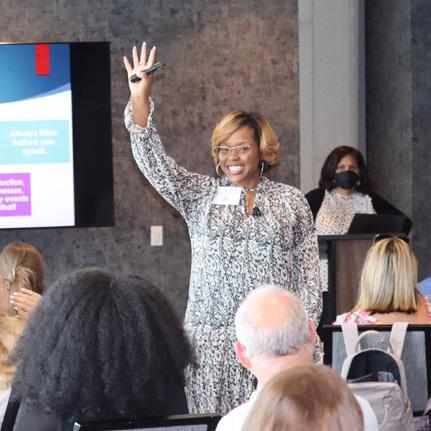

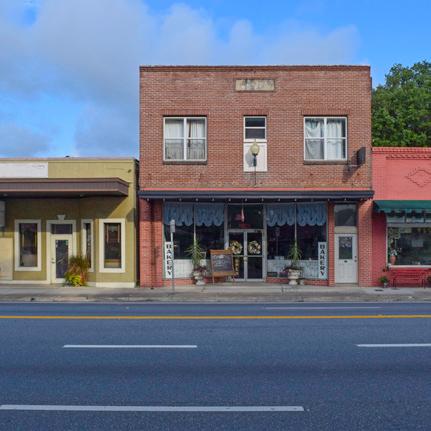
ADDITIONAL + Towns & Law: Supreme Court Ruling Sides With Sovereign Immunity 44 + Federal Focus:Federal Collaboration Focuses on Rural Resource Access 46
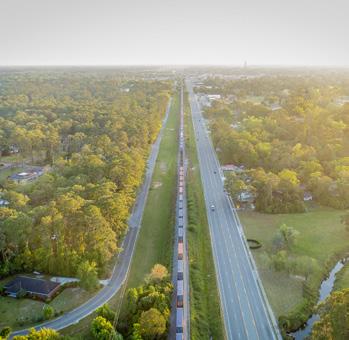
CITYLITES
48 + Georgia Gem: Morganton Point + Fairs & Fests
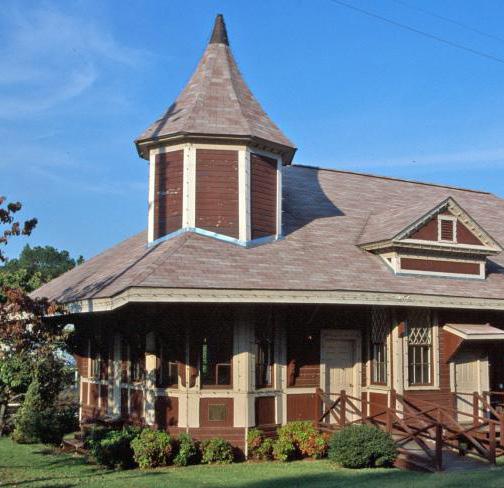
........................................................................................................
4
FOLLOW GMA ON SOCIAL MEDIA: Facebook & LinkedIn: Georgia Municipal Association | Twitter: @GaCities
Georgia Downtown Association Honors Excellence in City Projects, Leadership
The Georgia Downtown Association convened in Macon in August to celebrate the achievements of the Peach State’s city governments, downtown development authorities and city staff in continuing to develop innovative and unique programs and places for their communities. Cities large and small were recognized at the GDA Conference’s capstone event, the awards ceremony. From a festival celebrating pollinators to a new boutique hotel utilizing a historic downtown building, the projects recognized by the Georgia Downtown Association show the impact hardworking public servants and private partners can have on Georgia’s cities.
The Recipients of the Georgia Downtown Association 2022 Awards of Excellence are as follows:

September/October 2022 | gacities.com 5
Best Placemaking Project:
Thomasville – Flaunt 2022: Let’s Play!
Conceived 10 years ago to connect generations, in spire community and expose visitors to new ways of thinking and seeing, FLAUNT is a temporary public art explosion led by Thomasville Center for the Arts. Fu eled by the imaginations of local and regional artists, each FLAUNT exhibition takes on a new persona and, in turn, brings fresh new life to historic facades.
Featuring eight public art exhibitions scattered throughout the downtown Thomasville Creative Dis trict, FLAUNT2022: Let’s Play! also included interac tive game stations, live mural painting, playful photo opportunities and the unveiling of THOMopoly, a lo cal version of the popular Monopoly board game.
Best Façade Rehabilitation: Monroe –The Roe
For years, a key corner in the heart of downtown Monroe sat lifeless, waiting on the perfect buyer with the perfect vision to bring this 1900s beauty back to life. After almost two long years of work amidst the COVID-19 pandemic, what once was an eyesore now shines bright in the heart of downtown Monroe. The Roe is a market with fresh baked bread, wine and a whole-animal butcher, all connecting to a full-service restaurant. This renovation goes far beyond the his toric exterior to every detail of the interior, perfectly merging history with new-age art and design. This $1.5 million renovation is not only preserving the rich history of this building, but the history of the local experience.
Best Public Improvement Project: Cornelia – Level Grove Sidewalk Project
Level Grove Road is a downtown district corridor that connects travelers to downtown Cornelia from High way 441 and Highway 365. It is mainly within a resi dential neighborhood, but it is also walking distance to Habersham County’s largest employer, Fieldale Farms. This corridor houses many employees and low-income families, many of whom regularly walk to
work or downtown shops. The scope of the project in cluded sewer work, storm drainage, new 12-foot side walks, crosswalks, streetlights and a newly paved road costing the city more than $1.25 million. The complet ed project now connects the city from Highways 441 and 365 through downtown Cornelia and up to city limits at the Cornelia City Park and walking trail.
Best Adaptive Reuse: Canton –The Mill on Etowah (Co-winner)
Nestled on 35 acres along the banks of Canton’s Etowah River sits a stunning adaptive reuse develop ment housed in an expansive historic 120-year-old former cotton mill. Once the home of a thriving down town denim production facility, today The Mill on Etowah boasts a large brewery and taproom, commu nity green-and-screen, restaurants, wine bar, shops, co-working space, dance studio, gym and much more. This 250,000-square-foot destination also fea tures a variety of artwork including a bronze Creek Native American statue, a funky blackbird sculpture, a mural of the Etowah and many artistic photographs highlighting the area’s rich history.
Best Adaptive Reuse: Newtown Macon – Hotel Forty Five (Co-winner)
In February 2022, Hotel Forty Five became the first new hotel to open in downtown Macon in several de cades. This 94-room boutique hotel was a the single largest investment in downtown Macon in the past 10 years, totaling $39 million in value. Hotel Forty Five created 73 new jobs to run hotel operations, a fine dining restaurant, a rooftop bar and a coffee and wine bar.
While the economic impact of this project can be quantified by the number of room stays, people employed, sales tax generated and total cost of the rehabilitation, the hope and aspiration this project has brought to Macon’s community is invaluable. This project represents a turning point for downtown Ma con and shows that tourists are ready to visit and stay in Macon’s urban core.
Outstanding Community: Transforma tion – Downtown of the Year Moultrie
Moultrie’s downtown revitalization efforts began in 1989, when it became a Main Street City. As a result of 33 years of dedicated work, a great sense of pride has developed throughout the community. The city has worked with many organizations to enhance the downtown. Many projects have been completed to include a pocket park, the Mule Barn Park, en hancement of the Sportsman Park, enhancement of the Downtown Welcome Center, enhancement of a Covered Breezeway and addition of downtown speakers that cover a sevenblock area with music. These maiden projects have spurred private growth estimated to be over $2 million.
Premier Partner: Warrenton - Area Children’s Theatre, Inc.
Area Children’s Theatre (ACT) was founded in 2006 and continues to give children in the Warren County area the ability to participate in arts free of charge. More than 265 children volunteer for community events, helped complete downtown murals and more. ACT has produced shows like “Romeo & Ju liet,” “Comedy Through the Ages,” and “Godspell.”
ACT has been a champion for Hometown Warrenton investing over $30,000 into the Cultural Center and other projects.
Main Street Hero: Hartwell –Peggy Vickery
After her retirement from the corporate world, Peg gy Vickery has been a catalyst that has revitalized the Main Street organization and community in Hartwell. When Peggy took on the role of Main Street Coordi nator, she assembled a group of 40 volunteers and used the relationships she has built over a lifetime in Hartwell to bring people together to overcome obstacles. Some of her work includes overseeing a treescape project, downtown events and engaging and supporting businesses through Covid with a “Shop Small” campaign.
Best Creative Fundraising Effort: Rome - Downtown Dog Stations
The Downtown Dog Station Fundraiser was a twopart fundraiser stemming from the desire to have more accessible ways to clean up after dogs in down town Rome. The first part of the fundraiser was a dog mayor “election,” naming both a canine mayor and mayor pro-tempore. The second phase included downtown business owners, large corporations and more sponsoring pet stations in order to cover costs of signage, waste bags and other essentials to keep downtown Rome clean and tails wagging.
Premier Special Event: LaFayetteThe Honeybee Festival (Co-winner)
This community event has grown from fewer than 10,000 attendees in its first year to an astonishing 85,000 in June 2022 – more than 10 times LaFayette’s population. It takes more than 350 volunteers, many of which are our youth volunteers from LaFayette High School, and a diverse group of sponsors rang ing from large corporations to hometown small busi nesses. The event was formed from the belief that the honeybee’s importance in supporting agricultural security and economic vitality draws a close parallel to the importance in creating a community ecology of investment, pride and engagement to sustain the vibrancy of our local economy and citizenry.
Premier Special Event: Moultrie – Lights! Lights! Thanksgiving Night! (Co-winner)
This event features reindeer, pony rides, stilt-walkers, Santa Claus and more than 10,000 lights strung from the top of the downtown courthouse over a nineblock area. It’s magical, and brings a sense of unity and joy to all. On Thanksgiving night, once everyone has enjoyed a meal with their family, the entire town seems to descend into downtown Moultrie. With sounds of the season playing throughout the day and character cutouts staged around downtown, it is the perfect setting to enjoy all of the best parts of Christmas.
Creative New Event: Suwanee – Atlanta International Night Market - Glow in the Park
The city of Suwanee’s population reflects the cultur al diversity of metro Atlanta area. Over the years, as event planners work to bring events to match the inter ests and cultures of Suwanee’s changing demograph ics, it became necessary to broaden event offerings to represent a variety of cultural backgrounds. Glow in the Park was an established smaller event that brought bright glowing lanterns and a concert to the Town Center Park venue. Attendees are able to purchase lanterns onsite from the Suwanee Welcome Center, and this year’s event raised more than $8,000.
Outstanding Promotional Campaign Suwanee – Suwanee Annual Report
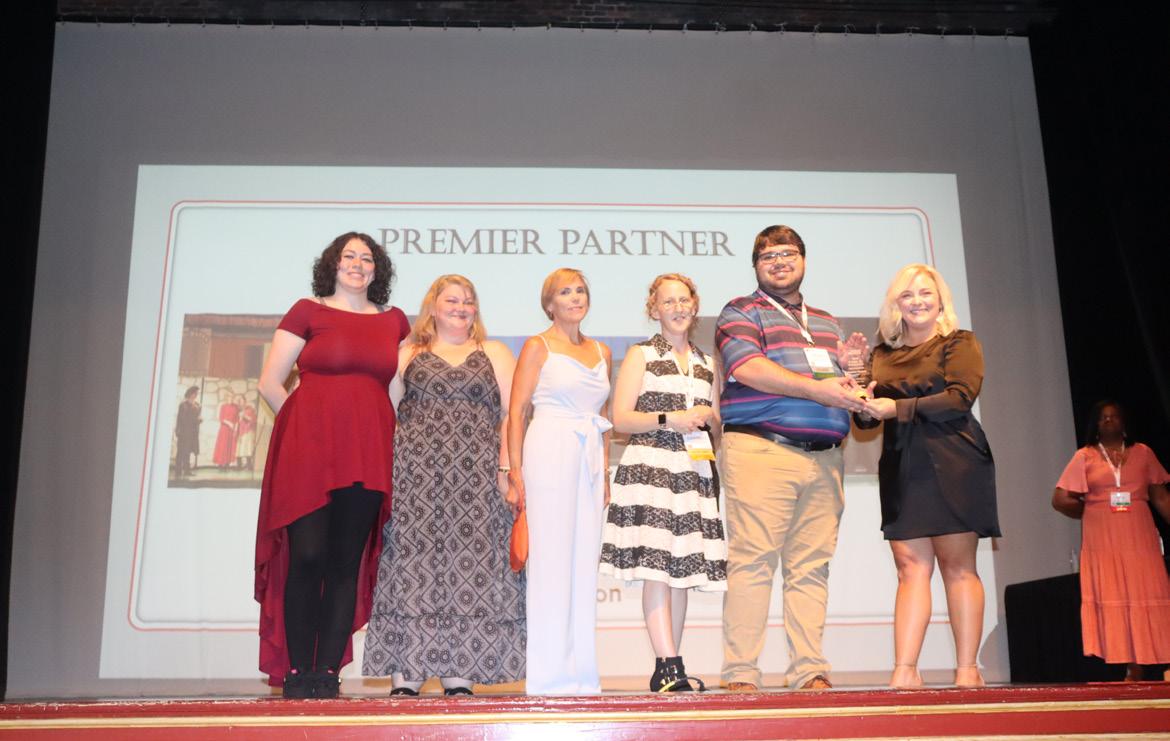
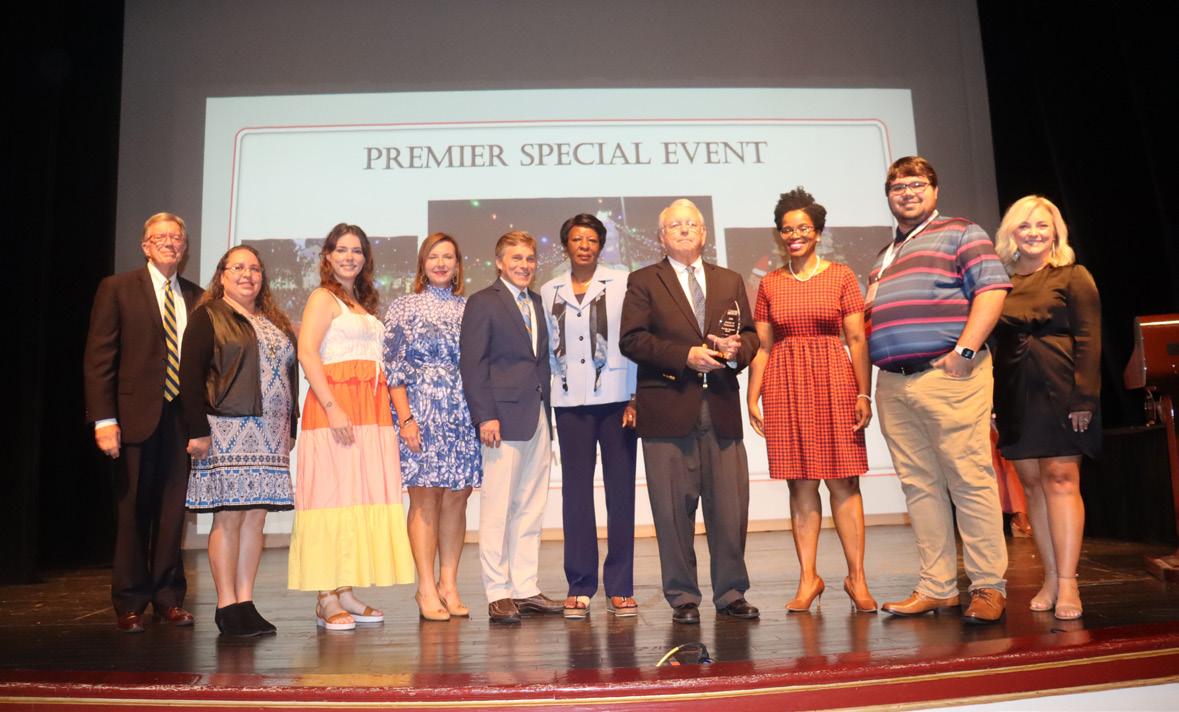
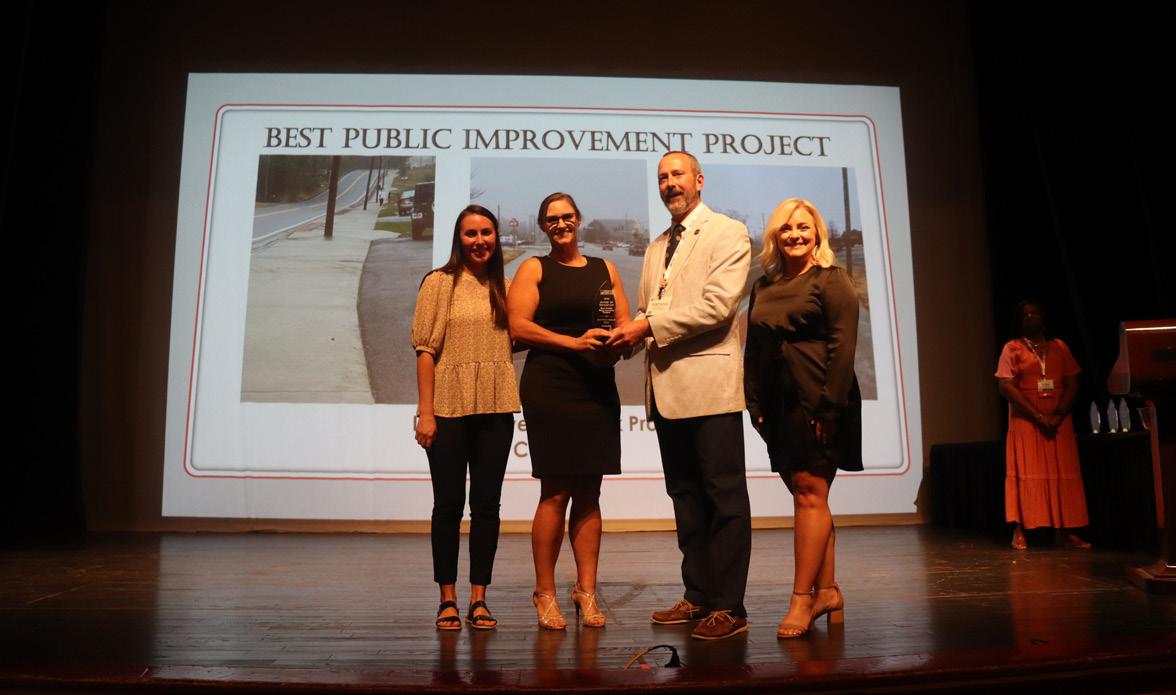
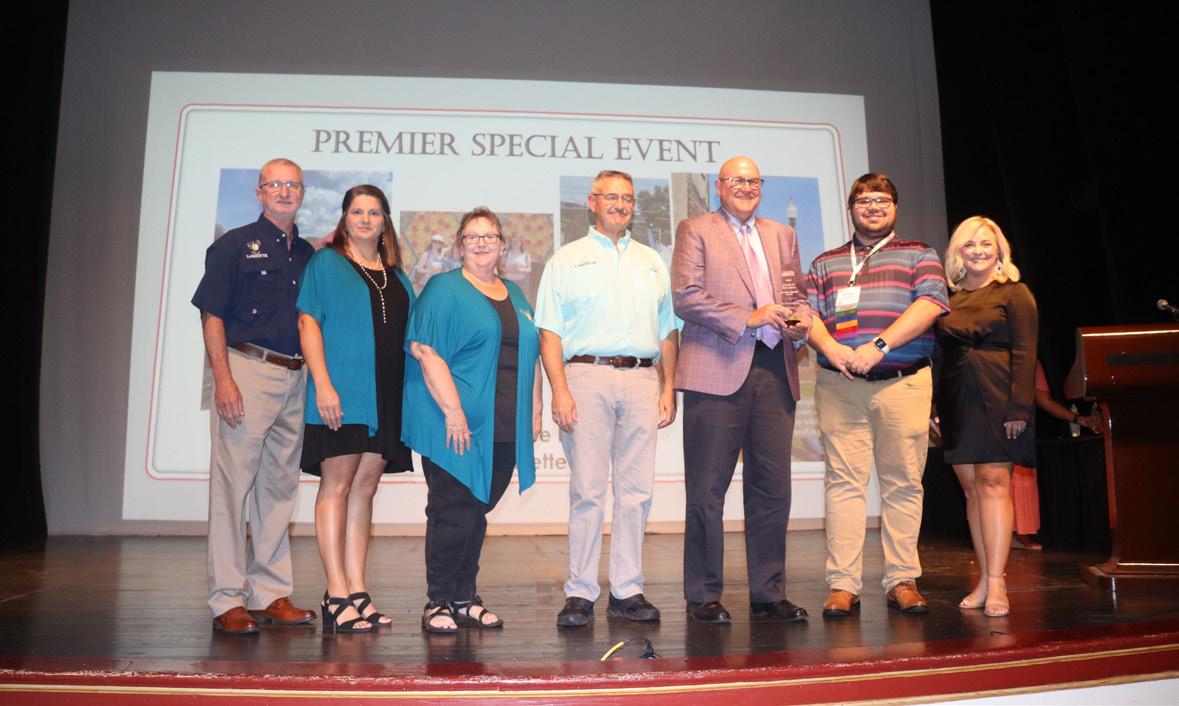
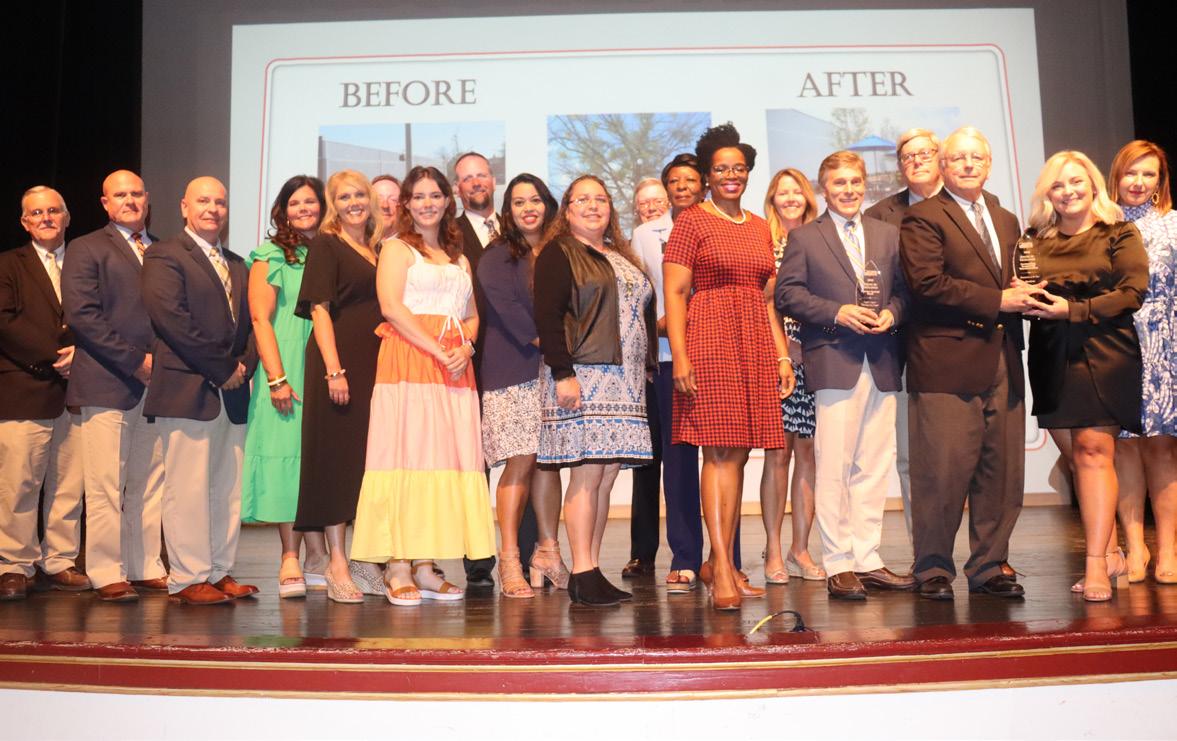
Annual reports can be boring. Suwanee acknowl edges this with their creative publications. Past re ports have mirrored “The Game of Life,” a comic
book edition and 2020’s “Seussical” narrative en titled “How the COVID Didn’t Steal 2020.” The publication bolsters Suwanee’s reputation as a fun, welcoming community that likes to do things a bit differently, while still advocating authenticity and transparency in government. All writing and design are completed by staff in-house.



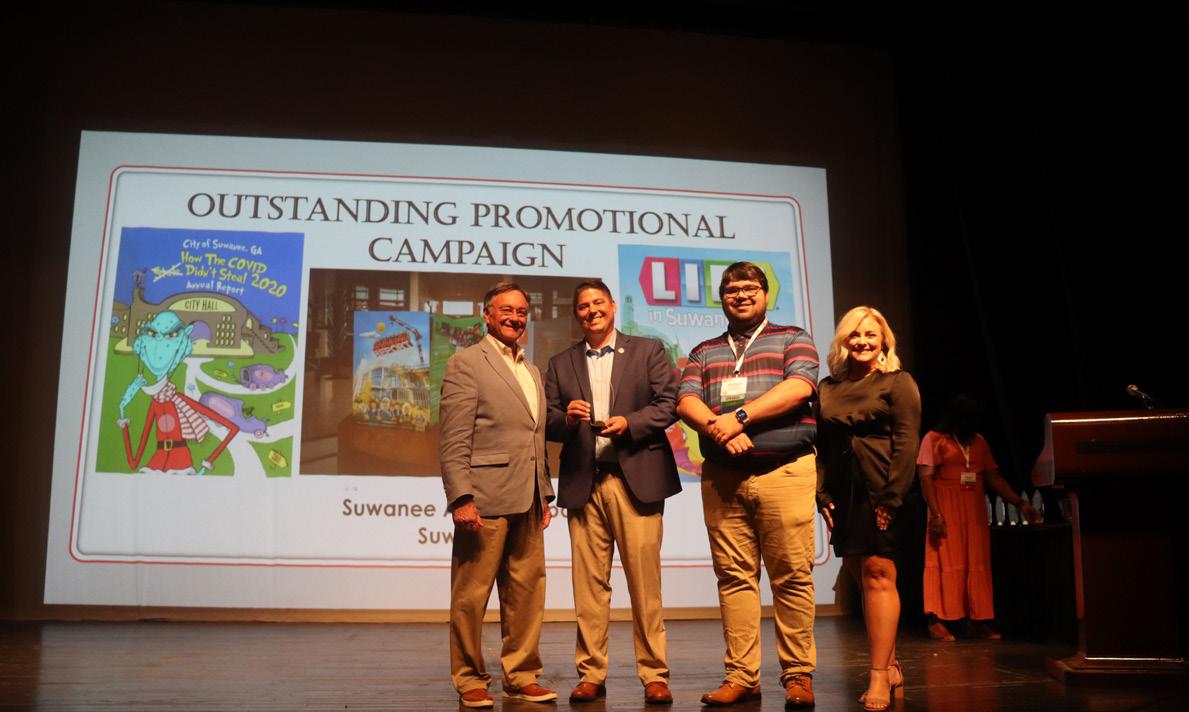


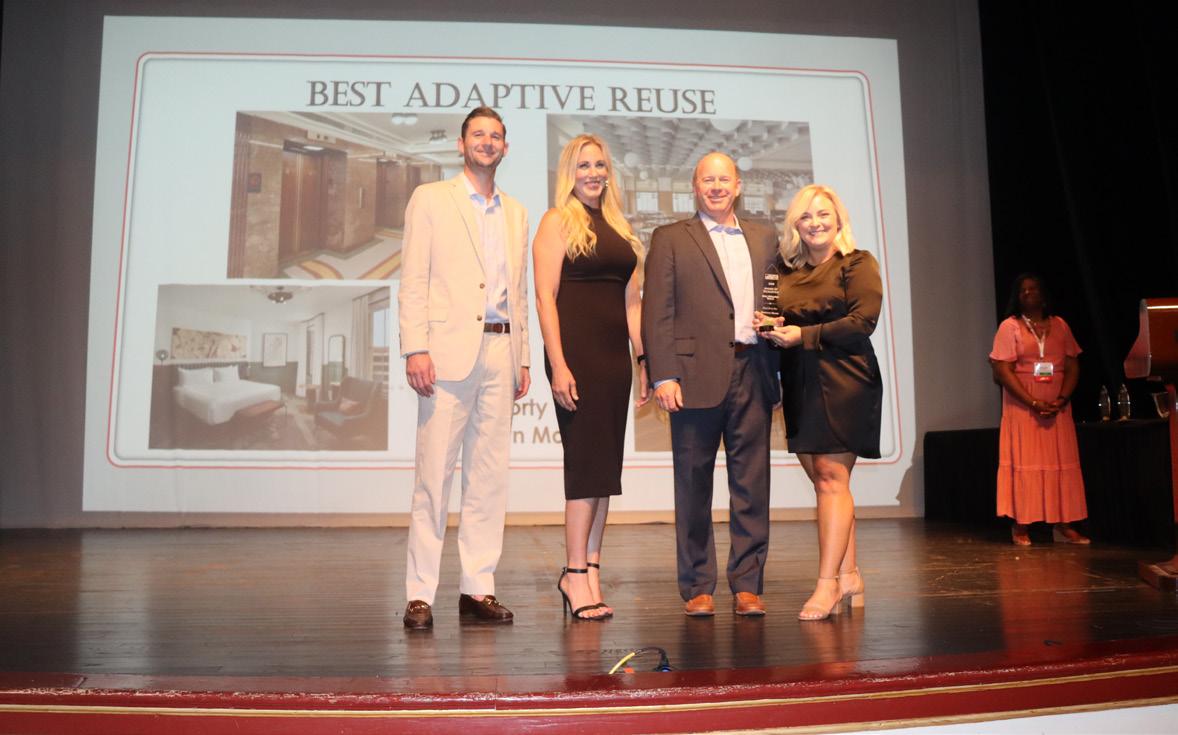
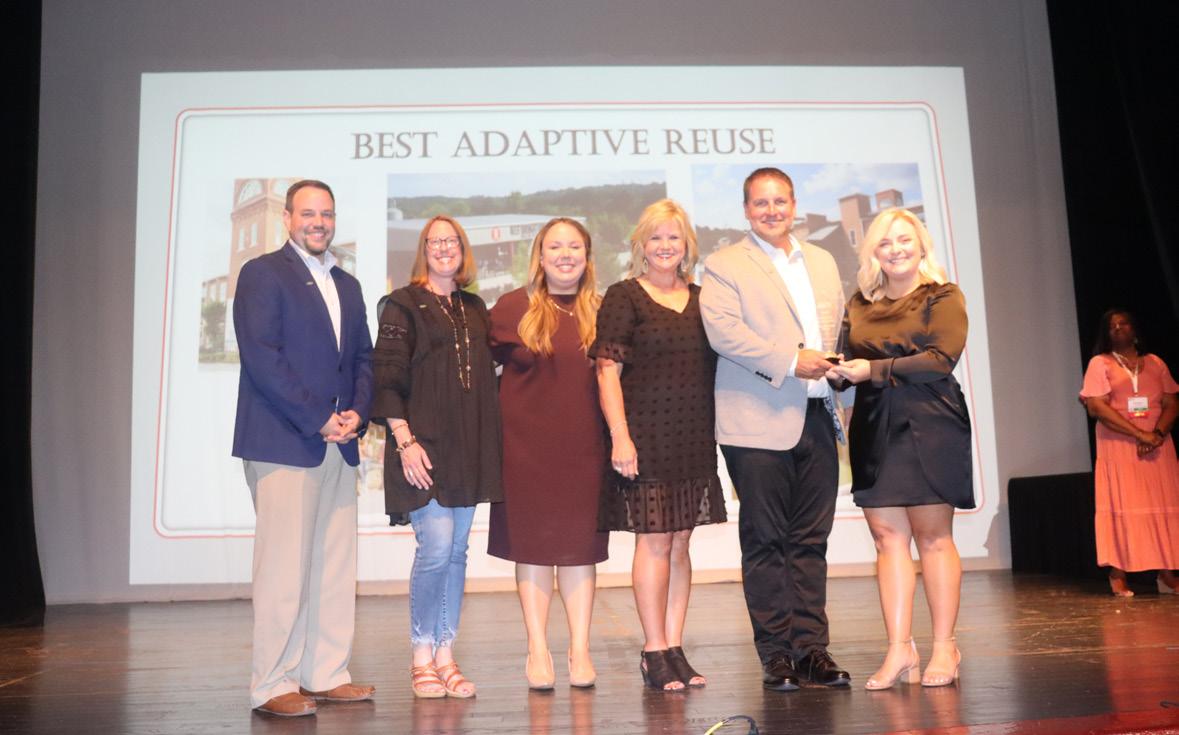
How to Manage Your Work-Life Balance as a Newly Elected Official
BY CHRIS OBENSCHAIN
Maintaining a healthy work-life balance is important in all careers, but for local elected officials, it’s not always easy. In some ways, it might seem like you’re never off the clock.
YOU’LL LIKELY OFTEN RUN INTO CONSTITUENTS in public, and while talking taxes or your voting record might not be what you planned on doing while making a quick run to the store, for public officials, it’s part of the job.
Balancing the demands of public office and home life can be a particular concern for younger elected offi cials. Long hours — especially for those with additional full-time jobs —concerned constituents and blurring lines between official duties and private life can all take a toll.
When it comes to running into constituents in pub lic, Bogart Mayor Janet Jones stressed the importance of encouraging them to become more involved.
“I do my very best to listen to their concerns, an swer to the best of my ability and then invite them to participate in our city council meetings,” said Jones.
Watkinsville City Manager Sharyn Dickerson be lieves keeping constituents informed is key to minimiz ing disturbances in your private life.
“I send out a weekly newsletter that provides in formation about upcoming votes or other issues that I thought my constituents might want to weigh in on be fore decisions are made. I also post similar information
on my Facebook page,” Dickerson said. “In my experi ence, this helps head off the late-evening phone calls and workday texts and/or emails, as my constituents feel informed and not caught off guard or surprised about community issues.”
Monroe Mayor John Howard believes younger generations’ schedules can have a significant influence on their work-life balance.
“Baby Boomers and older Gen X leaders see the workday as 8 a.m. to 5 p.m.,” Howard said. “Gen Z and Millennials may never have consistent work hours; work is 24/7 — emails at the coffee shop, meetings over Skype, 3 a.m. texts.”
Nobody can be “on” all the time. However, How ard believes younger officials’ resistance to adhering to a strict schedule, when combined with a focus on pri orities, can actually make elected life easier to handle.
“Gen Z and Millennials have a much better natural balance, but do not expect them to adhere to societal norms,” he said. “Not everything is pressing, and we, as leaders, must discern between the needs of public life and needs of our families.”
Young Harris Mayor Andrea Gibby, a 14-year veter an of public office, agrees.
10
“The most important thing is to create a separation in work and home. Yes, you will take your work home, but you can have boundaries,” Gibby said. “You don’t have to be on every committee. You can say no or ap point people to help.”
Here are some additional tips elected officials can use to maintain work-life balance:
Maximize Your Most Productive Time:
As long as the work happens, it doesn’t always matter when it happens. Everyone has a time when they tend to be the most productive, be it early in the morning, after lunch or at 3 a.m. Use that time to your advantage, whenever it is.
Don’t Forget to Take Time Off:
With everything going on, it might seem like taking a vacation is impossible. But the truth is, taking some much-needed time off will rejuve nate you and will help you be a more productive and better leader. So, in a way, you owe it to yourself (and your constituents) to take that beach trip you keep put ting off.
Know When to Say No:
There’s no question municipal leaders have important jobs to do. And while the scope of work may seem daunting, it’s important to know when to say no. Focus on your priorities and what you promised to do. Similar to the point above about tak ing a vacation, it’s even more important to not take on too much. Arranging priorities is critical for success as an elected official.
Don’t Be Afraid to Ask for Help:
The truth is sometimes you can’t say no. Emergencies can occur and priorities can change. It’s part of the job, so don’t be afraid to ask for help from other municipal leaders and employees. Re member that you’re all in this together.
Turn Off Your Phone:
Technological distractions can affect any one, but the interruptions can be partic ularly difficult for local elected officials. From angry constituents blowing up on social media to managing the fallout from the latest city council meeting, it might seem like your phone will never stop buzzing. So, turn it off. Schedule a time each day, such as during dinner with your family, that you shut down all electronic de vices. That way you can just enjoy each other’s compa ny. Don’t worry, those Facebook comments will still be there when you’re ready to log back on.
No matter how you choose to manage your worklife balance, when things get tough, remind yourself of your motivations for pursuing public office. Then re member that you can’t pour from an empty cup. Taking time for self-care will allow you to be most effective in serving your constituents.
September/October 2022 | gacities.com 11
Literacy is the Key to a Strong Tomorrow
BY JULIE SMITH , GMA PRESIDENT
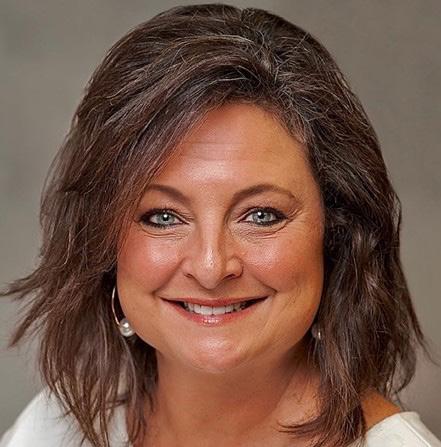
WE WORK TOWARD CREATING
A
high quality of life through investing in our downtowns; parks and recre ation programs and facilities; water, sewer and transportation infrastruc ture; public safety; housing; and arts and culture.
Yet, there’s something else that is a central ingre dient to the future success of our communities that re quires our attention and investment now. Something that falls outside the traditional day-to-day operational focus of cities. That is literacy. It is key to individual and community wellbeing and to the economic develop ment and prosperity of our cities.
A key literacy metric is third grade reading level. In Georgia, the most recent Kids Count data indicates that 68% of students at the end of third grade are not proficient in reading. Consequently, those students are four times more likely to drop out of high school than proficient readers. That reduces their potential earn ings and chances for success in adulthood. They are also more likely to have discipline problems and poor health. As adults, they are more likely to spend time in prison, struggle with unemployment, live in poverty and experience negative health outcomes.
This one key metric presents a significant chal lenge to our goal of creating communities that are safe, vibrant and thriving. We can, however, play an import ant role in addressing this challenge locally.
First, we must understand that literacy is not just an is sue for educators to address. The roadblocks to third grade reading proficiency are complex and require systemic change. While some of the roadblocks are certainly outside the purview of a city, our understand ing of them is important.
Second, we must be willing to lead and use our convening power to bring attention to this issue as well as bring local stakeholders together to develop a local plan to address it.
Third, we can support the efforts of local literacy efforts by recognizing them, providing space in city buildings for literacy classes, as well as integrating them into city operations when feasible.
And fourth, cities can participate in Georgia City Solutions (GCS) Mayor’s Reading Club. The goal of this new program is to improve the literacy skills and overall success with early reading for children through encouragement, support and leadership from city of ficials. Participating cities will receive a starter kit with a program implementation and resource guide, a sug gested book list and a copy of Georgia Caroline Visits City Hall, a children’s book developed for the Mayor’s Reading Club.
As we look to the future, let’s not forget that the reading proficiency level of today’s “next generation” is a key element in building communities where we want to live, work and play.
As city officials, most of us would agree that building safe, vibrant, thriving communities that provide a foundation for individuals to succeed is an important aspect of what we do.
CITYSCAPES 12
Anticipating What the Future Holds for Georgia’s Cities
BY LARRY HANSON, CEO AND EXECUTIVE DIRECTOR
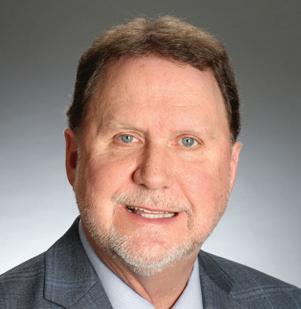
IT’S EASY TO GET CAUGHT UP in the daily grind. It is our duty as elected and appointed officials to respond to the issues in front of us, whether that be pothole complaints, trash pick-up, overgrown lots, or one of the many other matters that are brought to us daily. We find new imme diate challenges when faced with the consequences of a pandemic, natural disasters, an industry closing, work force challenges, the negative effects of inflation and more. And yet, it is essential that we pay equal attention to the future, and that we plan and prepare for it, to en sure our city’s success.
One of the greatest challenges we face today is re cruiting and retaining the workforce of the future. GMA has worked hard in this area with our Municipal Work force Development Advisory Council and a partnership with the UGA Carl Vinson Institute of Government. CVIOG conducted a survey of local governments and we have used that information to develop plans to assist cities in this critical area. We have a publication titled “Jobs With Purpose,” which is a strategy and playbook with focus areas in employee recruitment, employee retention, pay and benefits and planning and strategic partnerships.
A recent study highlighted for me a key challenge cities are facing as employers. There are four genera tions in the workforce: Baby Boomers, Gen X, Millenni als, and Gen Z. The challenge we face is that they do not see things in the same way. What each values and finds most important as employees is quite different.
Baby Boomers place compensation as the ultimate fac tor in employment, while younger generations tend to weigh money, benefits and professional growth togeth er. Gen Z and Millennial employees prioritize work that gives them a sense of purpose, and while that is also im portant to Baby Boomers and Gen Xers, it is not always a make or break factor.
Today’s workforce most values flexibility; internal mobility; and diversity, equity and inclusion. We must not get stuck in old ways and refuse to take this into account. To ensure that work is both meaningful and provides a sense of purpose, we need to consider these values when structuring our compensation and benefit plans as well as our work flexibility. As we plan for gen erational changes in employment, we must also plan for generational changes in what our citizens expect in their quality of life. Citizen engagement has never been more important in creating the sense of place that is needed to develop vibrant downtowns, parks and green spac es, gathering spots and local events centered around local interest. Infrastructure is critical to our future, but so are the quality of life services when people are choosing a place to call home, start a family or open a business.
At GMA, we are here to help you prepare for a bright and prosperous future. Please let us know how we can help you and always know we value your service to your city and to GMA and that by sharing and learn ing with and from each other, we are stronger and more successful.
The future of Georgia’s 537 cities is bright, and we are excited for what lies ahead.
As city leaders, we are always pressed to deal with the present, with all of its challenges and opportunities.
September/October 2022 | gacities.com 13
THROUGH THE
BY CAROLYN BERNDT, MCKAIA DYKEMA, SANDY FAZELI (NATIONAL LEAGUE OF CITIES)
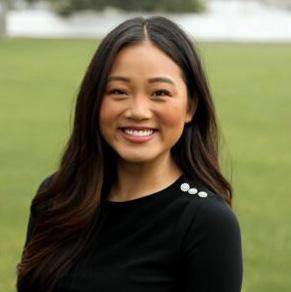
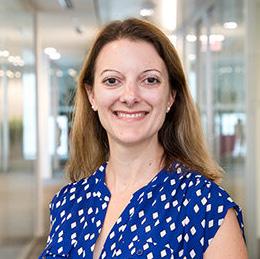
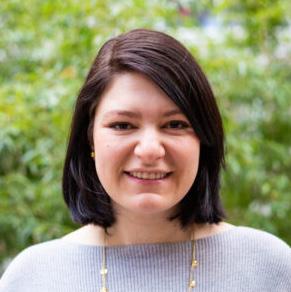
ONE
OF ITS KEY CLIMATE-RELATED
programs for state and local govern ments is the Energy Efficiency and Conservation Block Grant (EECBG), which advances energy efficiency, clean transportation and renewable energy projects in communities. While EECBG provides much-need ed federal funding to expand state and local efforts in these areas, coor dination is necessary among all lev els of government and the private sector to address the scale and ur gency of the climate crisis, as well as growing energy affordability concerns. Previous EEC BG funding provided state and local governments the opportunity to address sustainability priorities through actions such as improving transportation infrastruc ture, adopting and implementing building energy codes, strengthening electric grid policy and program making, and supporting community-driven climate and resilience planning. The renewed program fund ing enables state and local agencies to be responsive to their own unique market conditions and commu nity needs. It also establishes a new option to deliver public-private financing options for energy efficiency,
renewable energy and zero-emission transportation investments. Importantly, these funds create a plat form for local governments to leverage investments together to advance important community priorities.

THE EECBG OPPORTUNITY
The purpose of the EECBG program is to assist state and local governments in implementing strategies that reduce emissions in a matter that is environmentally sustainable and maximizes benefits for the communi ty; reduce total energy use; and improve energy effi ciency in the transportation, building and other appro priate sectors.
The $550 million in new funding under the EEC BG program will be split between state agencies and local governments. The formula for funds distribution includes 68% for larger cities, 28% for state energy offices, allocations for tribal entities and a competitive program.
Local governments should begin planning and communicating with each other now, and use their representative associations to elevate questions, com ments and plans to DOE.
To get started, below are some key considerations for local elected officials and city staff.
The bipartisan Infrastructure Investment and Jobs Act (IIJA), also known as the Bipartisan Infrastructure Law (BIL), directs more than $1 trillion to infrastructure improvements across the country. EXPERT EDITORIAL 14
STATE-CITY PARTNERSHIP
OPPORTUNITIES
ENERGY EFFICIENCY AND CONSERVATION BLOCK GRANT PROGRAM
• Think about regional impact and how to coordinate among multiple regional jurisdictions or through your metropolitan planning organization or council of governments to maximize the funding and im pact of projects. Smaller communities should con sider partnering with neighboring jurisdictions to leverage their funds. A successful regional partner ship may consider sharing administrative functions of the grant or implementation process.
• Consider state agencies as partners. Georgia’s state energy office is the Energy Resources Division of the Georgia Environmental Finance Authority.

• Identify projects that will have an impact in areas of the community that have the greatest need and how the project can meet the objectives of the Biden Ad ministration’s Justice40 initiative, focusing on envi ronmental justice. Ensure that the right stakeholders are part of the project planning and prioritization process, including representatives from these dis advantaged or vulnerable communities.
• Consider partnering with the state to leverage the local workforce and prioritize local hiring for EEC BG projects.
IDEAS FOR PARTNERSHIP PROJECTS
There is a lot to learn from EECBG projects previ ously funded under the American Recovery and Re investment Act of 2009, which jumpstarted many state and local sustainability and climate action plans across the country. Thirteen years later, states and lo cal governments have built a strong track record not only in planning but also in technology deployment, public-private financing and project implementation,
coordination and tracking – a track record that offers promising and impactful examples in preparation for the new EECBG funds.
Clean energy, climate and resiliency planning of fers a foundational step for communities to convene stakeholders, explore needs and opportunities, and set forth a path for projects and programs. Some states have provided grants directly to local governments to support community-led planning and clean energy project development. In other instances, local govern ments may band together for multi-jurisdictional plan ning and coordination efforts through regional coun cils or independently to advance a shared purpose.
Innovative clean energy financing programs offer another opportunity for state and local coordination. Commercial Property Assessed Clean Energy (PACE) programs, which leverage state and local property tax authority, are active in 28 states, including Georgia, and many states offer technical assistance and guaran teed energy savings performance contract options for locally-owned buildings.
As both states and local governments begin to consider the opportunities under EECBG and how they may partner to leverage the funding, they should keep in mind how these communication channels can also be leveraged to explore additional opportunities for partnership, such as through other provisions in the IIJA, state appropriations, utility ratepayer funds, greenhouse gas auction proceeds, FEMA pre-disas ter mitigation and transportation programs such as the Congestion Mitigation and Air Quality (CMAQ) or Volkswagen Settlement funds.
September/October 2022 | gacities.com 15
3 Cities Named Winners of 2022 Georgia Smart Communities Challenge
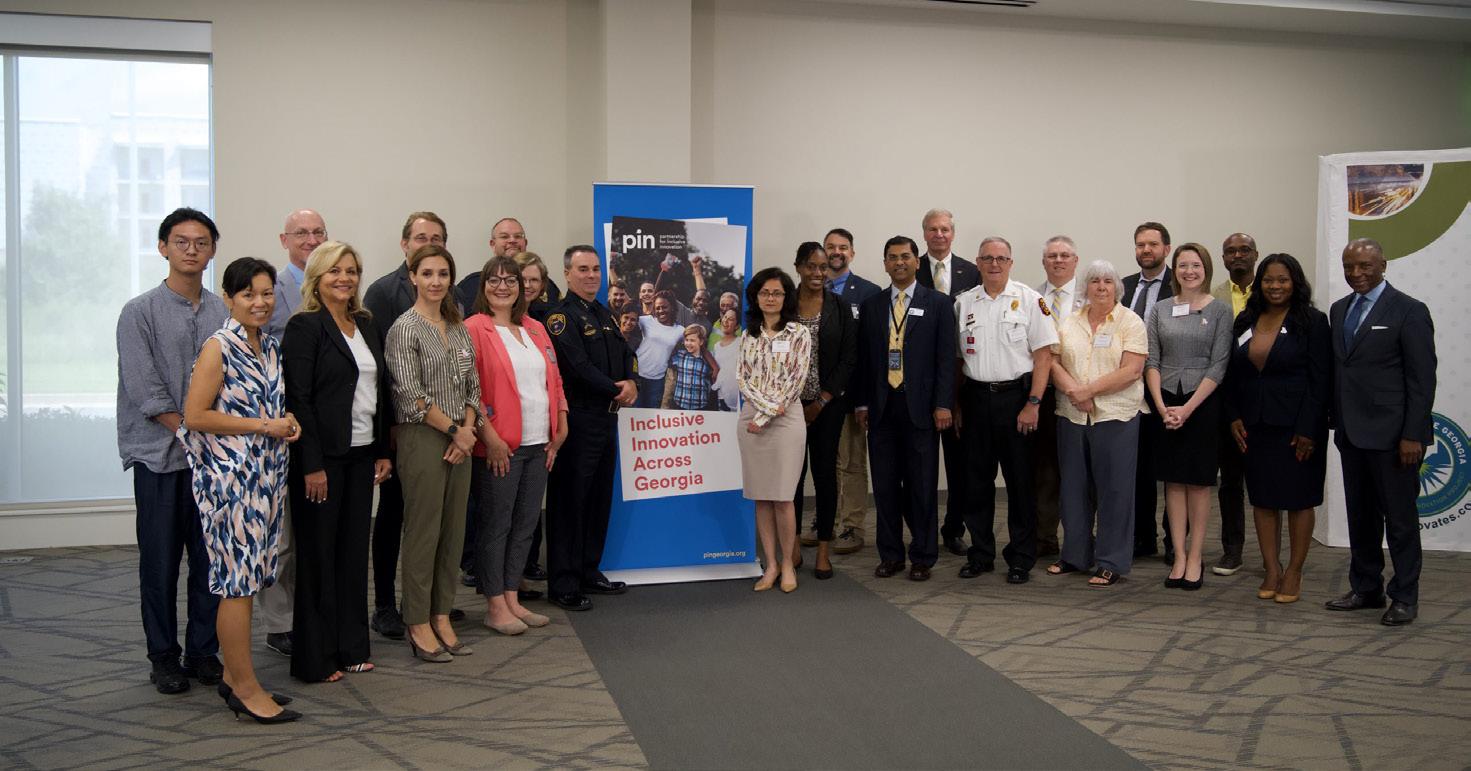
THREE CITIES HAVE BEEN NAMED WINNERS OF the 2022 Georgia Smart Communities Challenge. At lanta, Warner Robins and Athens-Clarke County were named alongside Henry County as this year’s winners of the program focusing on “smart local development.” In winning this recognition, each community will receive support for projects that leverage applied research, technology and data to further innovation and the 2022 theme, “smart resilience.”
Under that theme, projects addressing topics like disaster response, energy efficiency and public safety were considered for the honor.
“The selected communities submitted strong multi-disciplinary, multi-university research project pro posals that aim to advance innovation by leveraging technology and data,” said Stephanie Broxton, the Part nership for Inclusive Innovation’s (PIN) community re search manager. “Communities from throughout Geor gia were selected to ensure impact across the state.”
PIN is a consortium of leaders from the private sec tor, academia and government that promotes the advancement of technology and innovation across Georgia. The group supports the Georgia Smart Com munities Challenge.
Each of this year’s winning projects stem from collaborations between local government and near by colleges and universities. For the next year, each project will receive financial and technical assistance to support and continue the work of implementing applied research from university partners. PIN will also assist each community with monthly meetings, com munity engagement and project promotion
“This work is sure to create lasting transformative change, not just for the winning communities, but also for their neighbors and everyone who benefits from this research in the future,” said Georgia Tech Presi dent Ángel Cabrera.
Atlanta, Athens, Warner Robins recognized for projects partnering with universities
CITY DESK 16
The 2022 cohort communities and projects are: Atlanta
The project will use innovative diagnostic techniques to perform energy audits in Atlanta’s Thomasville Heights community, with the goal of achieving significant cost savings compared to traditional building energy audit ing practices. The audits are done with minimally inva sive drones equipped with remote sensing instruments to analyze building exteriors. The project is especially timely in the Thomasville Heights community, where ongoing challenges such as acute unemployment and poverty will soon be compounded by the closure of long-neglected subsidized housing. Researchers from Georgia Tech and Morehouse College, and representa tives from Focused Community Strategies will work with the city of Atlanta on this project.
Athens-Clarke County
The Climate Resilience Project through Technology and Transportation Innovation will evaluate and improve community preparedness in response to the growing severity of environmental disaster and the region’s in creasing population. The project will include the devel opment and deployment of a survey to gauge existing disaster preparedness and resident interest in improv ing preparedness in their communities. Leaders will engage with the community to create an all-hazards mitigation plan, neighborhood disaster playbook tem plate and strengthened neighborhood-level resource and relationship network. The goal is to minimize risk and work toward providing equitable outcomes for all members of the community in the event of a catastroph ic disaster. Researchers from the University of Georgia, Augusta University and Kennesaw State University will work with Athens-Clarke County on this project.
“Athens-Clarke County is dedicated to building a culture of readiness and resiliency for all of our resi dents,” said Mayor Kelly Girtz. “Through this partner ship, I believe we will make Athens-Clarke County a saf er, strong and adaptable place to live.”
Warner Robins
The project will develop and test a Citizen Safety Digital Twin for Community Resilience through the integration of a dynamic license plate reader solution with police department investigation practices. The project team will build on previous work to refine an interface that enables the police department to see where crimes are predicted to occur and suggest placement of license plate readers to detect them. This project will help War ner Robins to maximize both deterrence and detection, with the aim of lowering crime rates across the city. Re searchers from Georgia Tech and Middle Georgia State University will work with the city of Warner Robins on this project.
“Police departments are under-resourced and un derstaffed around the nation,” Warner Robins Mayor LaRhonda Patrick said. “The use of technology has been a force multiplier to reduce crime. This grant will give Chief [John] Wagner and the entire police department team the tools they need to provide public safety for our city. This is proactive crime prevention.”
Henry County
The Smart Resilience Decision Support Tool (DST) will be an interactive web-based tool to assist county planners, policymakers and county officials as they assess and explore the impact and potential of new greenspace, warehousing and freight-related infrastructure projects. The tool will help county officials answer the question: How can Henry County reconcile community economic development objectives with quality of life and energy resilience concerns? Researchers from Georgia Tech and Clayton State University will work with Henry Coun ty on this project.
“We are so excited and honored that Henry County has been chosen to receive the Georgia Smart Award,” said Carlotta Harrell, chair of the Henry County Board of Commissioners. “We continue to look for ways to improve and enhance transportation for Henry County residents and this continued partnership with Georgia Smart allows us to do just that.”
An ideal place to live? Look no further than Ideal, Georgia. The small town in Macon County was originally called Joetown, but in the early 1900s, two railroad executives stopped by while scout ing potential train stop locations. In a reply that could have been taken from Abbott and Costel lo, the first man called the town an “ideal” place for a new stop. The second replied, “And you’ve just named it!” The name stuck, and a post office for Ideal opened in 1906. The Georgia General Assembly made it official the next year, incorporating the city on Aug. 22, 1907.
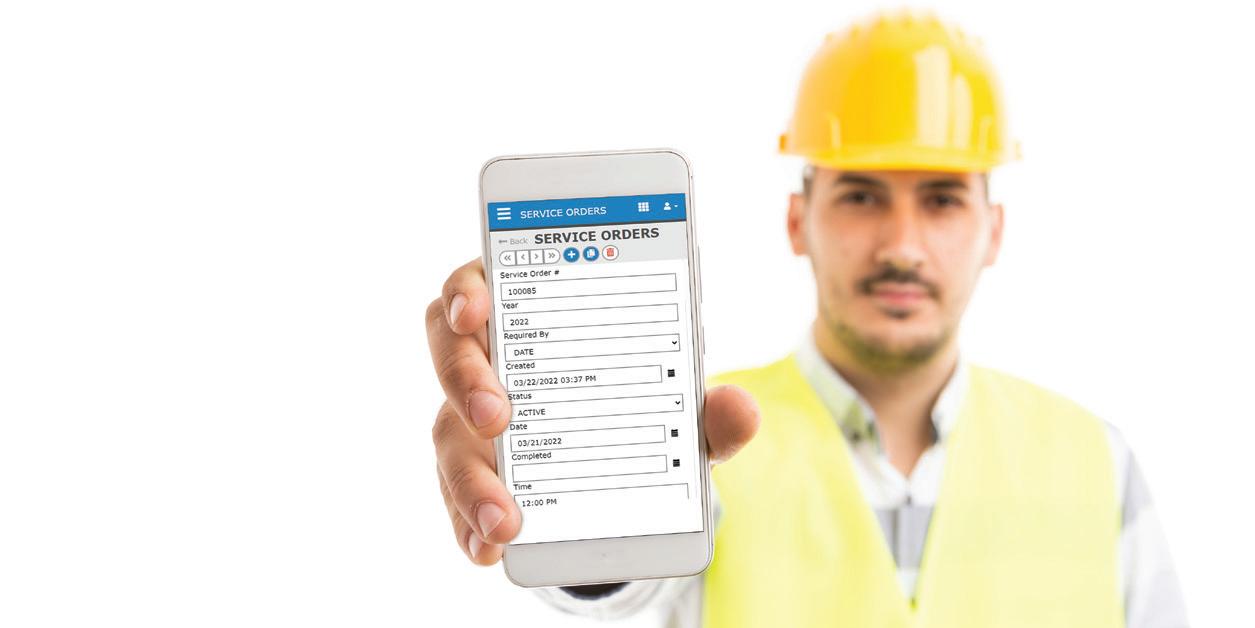


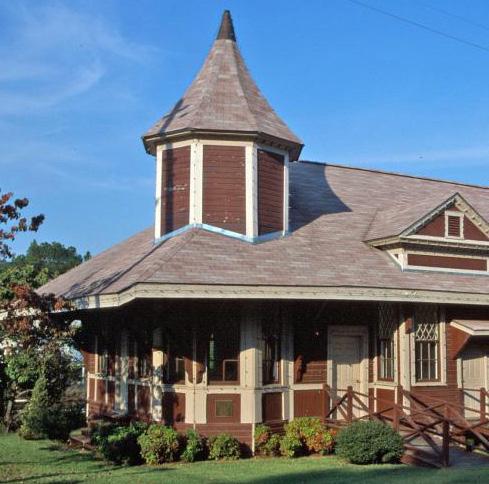
Located about halfway between Columbus and Perry, Ideal covers just 1.2 square miles.
ideal aspect is its location at the confluence of Whitewater Creek and Cedar Creek, both of which are tributaries to the Flint River. POPULATION: 407 MAYOR: Samuel Jenkins GMA DISTRICT: 8 City Spotlight City Spotlight Ideal For more information, call 800.353.8 829 or visit www.blackmountainsoftware.com Software solutions for your everyday needs: NEW!SUMMITSERVICE ORDERS Say “hello” to bright, shiny, and new! • Fund Accounting • Utility Billing • Cash Receipting • Accounts Receivable • Payroll • Permitting • NEW Summit Code Enforcement • And many more! Reduce office staff workloads and improve field crew workflows with web-based, cloud hosted Summit Service Orders.
Another
Equity and Inclusion Council Meets in Macon
Group prepares for launch of Municipal Government Equity and Inclusion Certification Program

THE SECOND MEETING OF THE EQUITY AND
Inclusion Advisory Council was held Aug. 10 at the Middle Georgia Regional Commission office in Ma con. The council was given up-to-date information about EMBRACE, GMA’s banner diversity, equity and inclusion (DEI) program. Freddie Broome, GMA’s Eq uity & Inclusion Director, continues to provide custom ized diversity, equity, and inclusion training for cities on request, in addition to providing basic DEI training as part of GMA’s regular training schedule through out the calendar year. Broome has provided basic DEI training and technical assistance to over 5,700 local officials and partner organizations since the program’s launch in January 2021.
Following the EMBRACE program update, the council reviewed the measurements and point values for each of the seven areas included in the Municipal Government Equity and Inclusion Certification Pro gram, which launches this fall. Workforce housing; education; health and well-being; public safety and restorative justice; community and economic de velopment; municipal workforce development and
employment; and community dialogue and stakehold er Engagement are the seven categories’ cities can use to achieve certification for addressing equity and inclu sion. To accomplish the initial certification, a city must apply for at least two categories, with community dia logue/stakeholder being one of the categories. A city can choose from four tiers of certification: bronze (two categories), silver (three to four categories), gold (five to six categories), and platinum (seven categories). To be eligible for recertification, a city must demonstrate that it continues to work toward equity and inclusion in its certified categories.
The advisory council also discussed options for providing discounts to cities that send multiple regis trants to a DEI training session and strategies for get ting additional cities interested in DEI programs.
The council’s next meeting is scheduled for Nov. 15 in Macon. Creating an ambassador program, which will teach advisory members to deliver the EMBRACE program during mayor-council work sessions, is one of the agenda items that will be discussed.
INSIDE GMA September/October 2022 | gacities.com 19
Creating a roadmap to jobs

University of Georgia partners with Georgia’s cities to address workforce challenges
BY MARGARET BLANCHARD, PUBLIC RELATIONS COORDINATOR, CARL VINSON INSTITUTE OF GOVERNMENT
GEOCITIES ACROSS GEORGIA NOW HAVE strategies and resources for tackling their workforce challenges thanks to research conducted by experts at the University of Georgia Carl Vinson Institute of Gov ernment (CVIOG) in partnership with the Georgia Mu nicipal Association (GMA) and its nonprofit, Georgia City Solutions (GCS).
The Jobs With Purpose: Georgia Municipal Workforce Development Strategy and Playbook 2022 was pre sented to the GMA Board of Directors during the asso ciation’s Annual Convention in Savannah this summer.
“The report provides a playbook for cities to pro actively address workforce needs through investment, planning and strategy implementation,” said Larry Hanson, CEO and executive director of GMA.
20
The municipal workforce strategy is based on a needs assessment of municipalities across the state that deter mined workforce challenges and opportunities for ad vancing workforce development efforts.
“Ultimately, this is about making sure our municipal governments have the qualified workers they need. Cit ies aren’t immune from labor market challenges, but this work provides an advantage for municipal leaders look ing to recruit and retain talent,” said Greg Wilson, an as sistant director at CVIOG, a public service and outreach unit at the University of Georgia. “We look forward to assisting municipal leaders in their efforts to build a sus tainable, high-quality workforce.”
GMA’s Municipal Workforce Development Adviso ry Council, comprised of city staff and elected officials as well as statewide stakeholders — including partners from the Georgia Department of Education, the Techni cal College System of Georgia and the University System of Georgia — guided the Jobs With Purpose initiative.
After analyzing the needs assessment, the advisory council identified a two-pronged strategy for address ing municipal workforce needs. The first prong focuses on statewide strategies, partnerships and investments that GMA and GCS will pursue on behalf of Georgia’s cities.
GMA and GCS will develop resources for cities to promote public service careers, expand the municipal workforce toolkit on the GMA website and provide grants for technical assistance and funding to assist with pilot programs based on strategies found in the playbook.
Shelly Berryhill, chair of the Municipal Workforce Development Advisory Council and Hawkinsville com missioner, said the playbook prompts cities to review current strategies by asking questions such as: What are the best recruiting methods? What benefits do we need to add to be more competitive in today’s envi ronment? Is our pay scale in line with other cities and competing industries?
“Our goal is to help cities find ways to compete for employees and to assist GMA and Georgia cities in

supporting this endeavor,” Berryhill said. “There’s more work to do as we further define and implement these steps, but we’re off to a great start.”
The second prong of the strategy focuses on ac tions city governments can take to address their unique workforce needs. The advisory council identified four strategy areas: employee recruitment; employee re tention; pay and benefits, and planning and strategic partnerships.
To illustrate best practices in employee retention, the playbook features the city of Douglasville’s “Promot ing Within Policy.” Part of the city’s employee handbook, the long-standing policy allows internal candidates the first shot at newly posted positions within the municipal government. In 2020, approximately 28 employees were promoted through this pathway. Another eight and 16 moved up in 2021 and the first half of 2022, respectively.
Teaa Allston-Bing, Douglasville’s human resourc es director, said having a written procedure is just the first step in retaining workers; it also requires consistent communication and ample professional development.
“Now more than ever we have to be intentional about not only this policy, but all of our policies,” All ston-Bing said. “When employees see that we hold true to these practices — that we do promote within before we even open up ourselves to the external market — then it becomes a known factor and makes us a great place to work.”
Highlighting the benefits of a robust municipal workforce is also an important takeaway from the Jobs With Purpose playbook for Sonja Fillingame, city man ager of Union City.
“The framework goes beyond a ‘supply-and-de mand’ issue,” she said. “It goes to the very heart of service delivery — having the bandwidth necessary to provide citizens with high-quality public safety ser vices, infrastructure investment, recreational amenities and more.”
September/October 2022 | gacities.com 21
Young
Topics include new Trail Systems, Infill Redevelopment, and a Workforce Development Pipeline
Gamechangers present Big Ideas to Dalton/Whitfield County 22
SINCE THE BEGINNING OF THE YEAR, 45 OF Georgia’s brightest young professionals have been working in Dalton-Whitfield County. They have met with community leaders, toured businesses and schools, visited neighborhoods and parks, researched history and re-imagined the area’s connectivity in their quest to come up with big ideas and innovative solutions to some of the Dalton’s most persistent challenges. Their final recommendations from their hard work were pre sented to the community on Sept. 29 at The Dalton Convention Center.
The Young Gamechangers are made up of profes sionals from across the state between the ages of 24 and 40 who work in diverse sectors including business, non-profit, education, finance, media relations, real es tate, technology, agriculture, healthcare, politics, mar keting and economic and urban development.
“Our challenge question focused on redevelop ing neighborhoods to attract families that want to live, work, and play in Dalton-Whitfield County,” said An drew Thomas II, a process engineer at Shaw Industries. “After researching the success of similar efforts around the country, we landed on initiatives that can catalyze growth by redeveloping underutilized community assets.”
The 2022 Young Gamechangers’ recommenda tions include an outdoor recreation project that could make the North Georgia city more walkable for resi dents and visitors.
“Although each component of our group’s work is meaningful, I’m most excited about the new greenway project, the ‘Mill-Line,’ which is a proposal to connect downtown Dalton to the Crown Mill,” Thomas said. “As
someone who spends a lot of time in Dalton, I can’t wait to see this project come to fruition so my family, along with many other current and future residents, can con tinually enjoy all the beauty and history Dalton has to offer.”
The Young Gamechangers group took many factors into consideration during their work, including Dalton’s racial, ethnic and socioeconomic diversity. The city is a hub for carpet manufacturing and has a large Latino population, including many who are Spanish speakers.
“[We were] challenged to inspire diverse commu nity engagement in Dalton by empowering everyone, specifically Dalton’s large population of Hispanic res idents, to be involved and invested,” said Amanda Brown, executive director of the Dalton Creative Arts Guild. “After asking questions, listening, and collecting experiences from our community at large, our team is excited to propose ideas that encourage sharing with and learning from each other so that we can all move forward stronger – together.”
Next year, the Young Gamechangers will be focused on another great Georgia city.
If you or someone you know would like to apply to be a Young Gamechanger, the online application is online at georgiaforward.org/younggamechangers.
September/October 2022 | gacities.com 23
Learning the Ropes: Mentorship Program Brings Benefits on Both Sides
As part of GMA’s commitment to expand cost-effective learning and networking opportunities for elected officials, GMA offers a mentoring program to help newly elected officials acclimate themselves to their new roles.

LOCAL GOVERNMENT IS A COMPLEX AND constantly changing environment, which can be over whelming for a mayor or councilmember taking on that new role for the first time. Through GMA’s mentoring program, elected officials can obtain support, guidance and encouragement from seasoned officials willing to give of their time. Many of the mentors were once mentees of the program and know the benefits they received from their mentor. Therefore, they are very ex cited to sign up as a mentor once they have achieved four years in office, to offer that same knowledge to their assigned mentee.
As part of the mentor program, mentors and men tees are encouraged to meet with one another in their
prospective cities, to share the good things they have going on in their communities, to share how their cities operate and to build relationships with each other. They also correspond monthly and whenever they need sup port. It is not just the mentees that gain from this pro gram, the mentors express that they get as much knowl edge from their mentees as they give. It is a beneficial program for all.
If you would be interested in becoming a mentor or if you are within your first two years of service and would like to be assigned a mentor, you can find more infor mation on GMA’s website under “Training & Education” and “Mentoring Program.” You can also reach out to Sherri Bailey at sbailey@gacities.com.
24
“This program is amazing. I was matched up with JoAnne Taylor who was running for mayor while she was my mentor. Even still, she made time for me and truly cared about my elected official experience. She was also really helpful with current challenges we were facing and ordinances we were discussing. She was more than happy to share stories of how her town navigated similar situations. I am so grateful for her time and wisdom. And now I have a friend in another city in Georgia. “
— AMANDA MOONEY, COUNCILMEMBER, WINTERVILLE
“My Mentor is Mayor Van Johnson of Savannah. The mentoring program was both beneficial and rewarding. I was able to depend on Mayor Johnson for solid leader ship advice as I adjusted to the role of a newly elected official. The GMA mentoring program gives you the opportunity to have a person that can provide some expertise and knowledge on issues or concerns that you might be experiencing as a newly elected official.”
— FRANCINE SCOTT, COMMISSIONER, AUGUSTA-RICHMOND COUNTY
“The GMA mentorship program was truly a blessing to me. I won in a special election to fill my dear friend’s term after his passing, so I was already anxious and wanting to ensure that his memory and legacy lived on and that I made him proud. My mentor welcomed me with open arms and took my calls regardless of the time of day or night I called. We have become friends often sharing about our grandchildren. She was always encouraging and pointed me in the right direction. It was good to have someone with her years of experience to counsel me on matters that were at that time, out of my wheelhouse. Many days I thought to myself, ‘What have I gotten my self into?’, but her words of assurance that I was equipped to do the job helped me weather the difficult times and I’m grateful for her and this program. I would encourage any new councilmember to take advantage of this mentorship program. “
— CERETTA SMITH, COUNCILMEMBER, GROVETOWN
“As a newly elected official, the GMA mentorship pro gram served as a great resource that enabled me to step into my new role and hit the ground running. Having a mentor helped me to focus my priorities and set first-year goals that I would have never thought about or considered before. Some things you can’t simply learn or understand just by reading, or attending training. As an elected official, relationships are critically important. The men tor/mentee relationship is the first of many in learning how to navigate through and in an arena where there are so many existing relationships. The insight from my mentor Phil Bynum helped me tremendously. His mentorship and experience gave me a real life example to follow. His candor, willingness to share his own experience and wisdom are all qual ities that I’ve learned.”
— LISA JAMES, MAYOR PRO TEM, ST. MARYS
“I was paired with Commissioner Marian Solomon-Grimes from the city of Waycross. From the beginning, Com missioner Solomon-Grimes was kind, approachable, professional and knowledgeable. She was candid, she provided insight and guidance. The transfer of knowledge shared by Commissioner Sol omon-Grimes and her expertise about local government was invaluable.
The mentor program afforded me an opportunity to have one-onone access with an experienced local government official. Commissioner Solomon-Grimes and I have developed a lifelong friendship.
I would like to express my sincere appreciation to Commissioner Marian Solomon-Grimes for participating in the Mentor Program and her friendship. I would like to thank GMA for offering the Mentor Program, I have truly benefited. “
— L.CARLA GIBSON-WRIGHT, COUNCILMEMBER, ALAPAHA
September/October 2022 | gacities.com 25
Making Cultural Diversity Work Training Hosted at GMA Headquarters
New Course Debuted in 2020
AS PART OF GMA’S WORK TO FURTHER EQUITY and inclusion in Georgia’s cities, the association is host ing a daylong Making Cultural Diversity Work training at its headquarters Oct. 20.
The class was first offered in fall 2020, as GMA began to ramp up its equity and inclusion efforts. Cul tural diversity training is essential because our country, states, cities and organizations are made up of individ uals from various cultural, racial and ethnic groups. In this course, participants learn how to build connec tions across identity lines and facilitate an environment that is welcoming and considerate of all.
As we work to improve relationships within our orga nizations and communities, it is critical to leverage the strength of diversity, become inclusive leaders and facilitate essential conversations within our groups. These skills will lead to collaborative efforts that ensure efficient and effective government.
The last day to register for this training is Oct. 18. Those traveling from out of town can book a room at the Holiday Inn Express and Suites Atlanta Downtown at a reduced rate. Visit gacities.com for a link to the room block, or ask for the Georgia Municipal Associa tion block when calling the hotel.

26
Better Together: GMA and ACCG Hold Joint Legislative Policy Council Meetings
NOAH ROENITZ
ON SEPT. 7, THE LEGISLATIVE POLICY COUNCILS (LPC) from the Georgia Municipal Association and the Association County Commissioners of Georgia met in the consolidated city-county of Columbus. True to the jurisdiction of the venue, this joint meeting was born out of a spirit of collaboration and duty to best serve. This meeting marked the third iteration of this event and works to drive home the sentiment that city and county officials have far more in common than they do differences.
‘We want the same things, more local control - less preemptions and unfunded mandates.’ – GMA LPC Chair - Mayor Randall Walker of Perry Georgia
To head off the meeting, city and county officials heard from several speakers who outlined key facts and figures pertaining to growth in the state of Georgia. These discussions were headed off by Jeffrey Dorfman, the state fiscal economist of Georgia, who presented on the economic outlook within the state with a focus placed on regional differences. Officials next heard from Taylor Hafley, an applied demographer with the Carl Vinson Institute of Government (CVIOG) who presented on Georgia’s changing demographics and how they are affecting growth.
Following Taylor was Carmen Chubb, president of Columbia Residential, a workforce housing developer who spoke on the impacts of growth and shifting de mographics on communities in the state, and in turn how those inform development practices. Mike Car nathan, manager of the research and analytics division
at the Atlanta Regional Commission, followed, ad dressing the state of housing in Georgia with a focus on affordability and the role local governments play. Rounding off the presentations was Katherine Moore, president of the Georgia Conservancy, who spoke on the role of placemaking in informing development practices from a local government standpoint.
The focal point of the meeting was on the facilitat ed activity by the University of Georgia’s Carl Vinson Institute of Government. CVIOG’s Mara Shaw and Suzette Arnold lead the local government officials through a series of collaborative exercises which re quired these leaders to answer key questions among their co-mingled groups. These questions challenged officials to think about solutions to rural emigration, re lationship building, and public service at large.
Following the activity, the meeting was concluded by remarks from GMA President Julie Smith (city of Tif ton) and ACCG President Melissa Hughes (Tift County Board of Commissioners), as well as GMA CEO and Executive Director Larry Hanson and ACCG Executive Director Dave Wills.
Above all, the meeting showed the strength in unity of our organizations and the power local govern ments can wield when aligned.
‘We have all been elected or appointed to serve our constituencies and I am proud to participate in this meeting to proclaim that our local governments will be stronger because we are committed to working together.’ – GMA LPC Chair - Mayor Randall Walker of Perry Georgia.
City, county leaders find ways to work together on top issues
September/October 2022 | gacities.com 27
Georgia Government Communicators Convene to Learn and Network
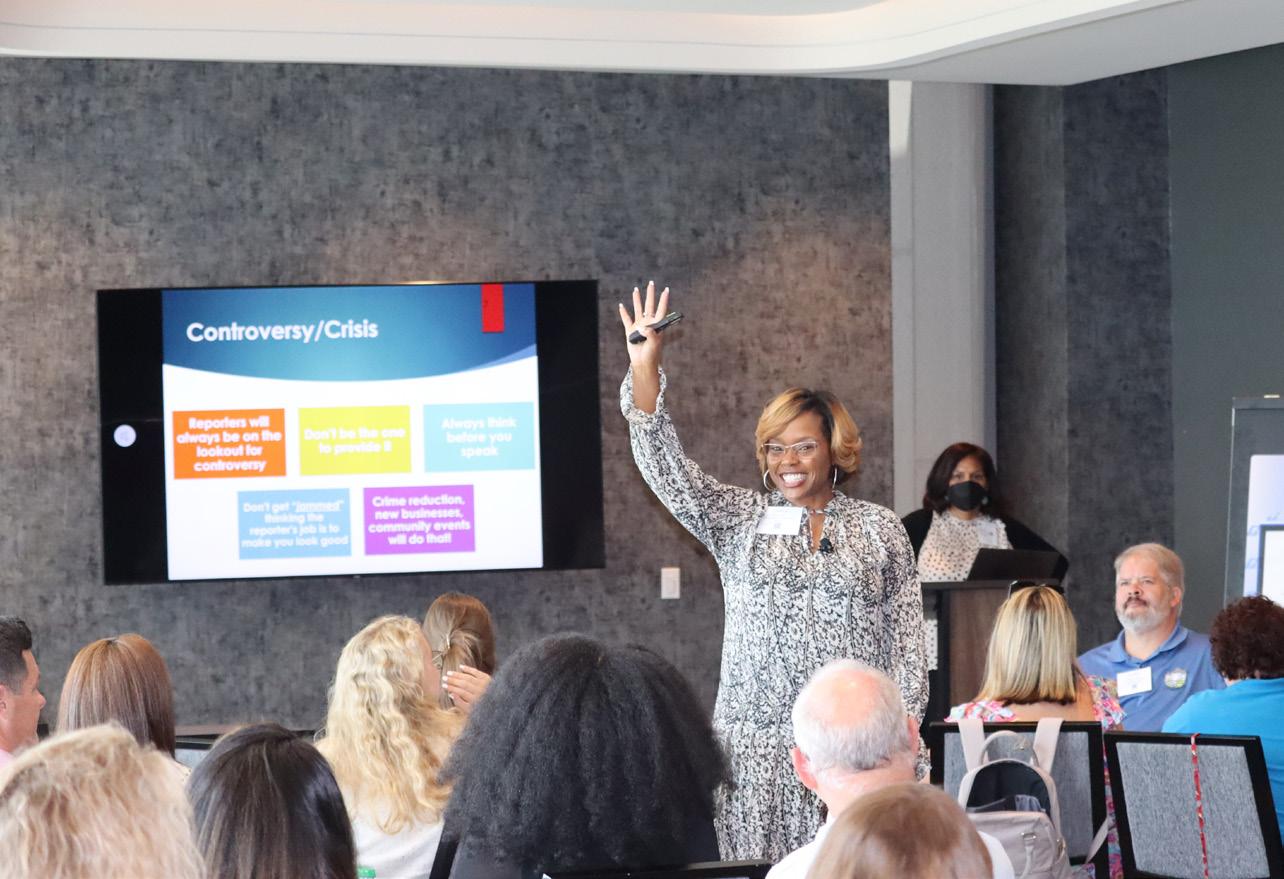
More than 60 city and county communicators from around the state gathered in Columbus, in August for the 7th Annual Government Communicators Conference, presented by the Georgia Municipal Association and the Association County Commissioners of Georgia.
PARTICIPANTS
KICKED OFF THE CONFERENCE

with a golf cart tour that showcased recent city devel opment along the Chattahoochee River and uptown Columbus.
The opening session featured veteran news re porters Mark Rice of the Columbus Ledger-Enquirer and Mark Winne of Atlanta’s WSB-TV. Both journalists encouraged the communicators to build relationships with local media representatives.
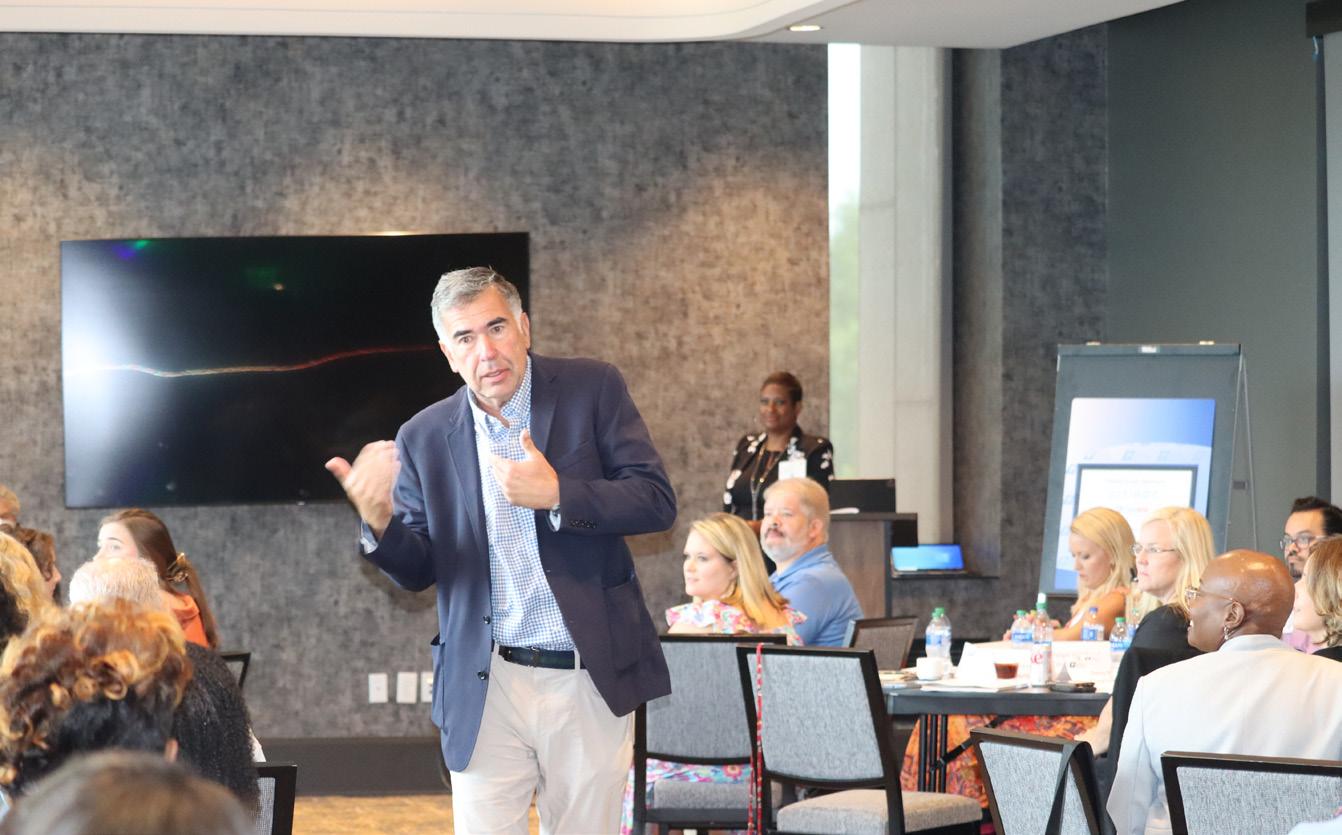
Brookhaven Communications Manager Ann Marie Quill provided graphic design tips using Canva and oth er apps. In her Diversity, Equity and Inclusion session, Decatur Communications Director Renae Jackson dis cussed the importance of inclusive communications and engagement. She invited communicators to create a plan to engage diverse audiences in their communities.
Atlanta Police Department Public Affairs Director Chata Spikes gave real-life examples of dealing with the media during a crisis. Fulton County Digital Com munications Supervisor Marcell English shared ways communicators can create a digital and social media content plan. Douglasville Digital Media Manager Steve Jones provided tips on creating a local govern ment podcast and produced a podcast during the conference. In his interactive session, IKON Filmworks Managing Partner James Hammonds gave some best practices and applications to capture amazing photos and videos with a cell phone. Other session topics in cluded open government and social media and mes saging on American Rescue Plan Act fund usage.
Fayetteville Public Information Officer Danny Harri son said the Government Communicators Conference
Photo captions: WSB Reporter Mark Winne encouraged communicators to build relationships with the media. Atlanta City Police Director of Public Affairs Chata Spikes gave tips on managing a crisis. East Point Public Information Officer Shannon Wiggins and Douglas County Communications Operations Manager enjoyed the networking and informative sessions the conference offered
is the highlight of his department’s year.
“The sessions are always on point,” said Harrison, who has attended the conference every year since 2017. “We’re still working through our list of takeaway points, which will impact our communications department strategy in the months ahead.”
East Point Public Information Officer
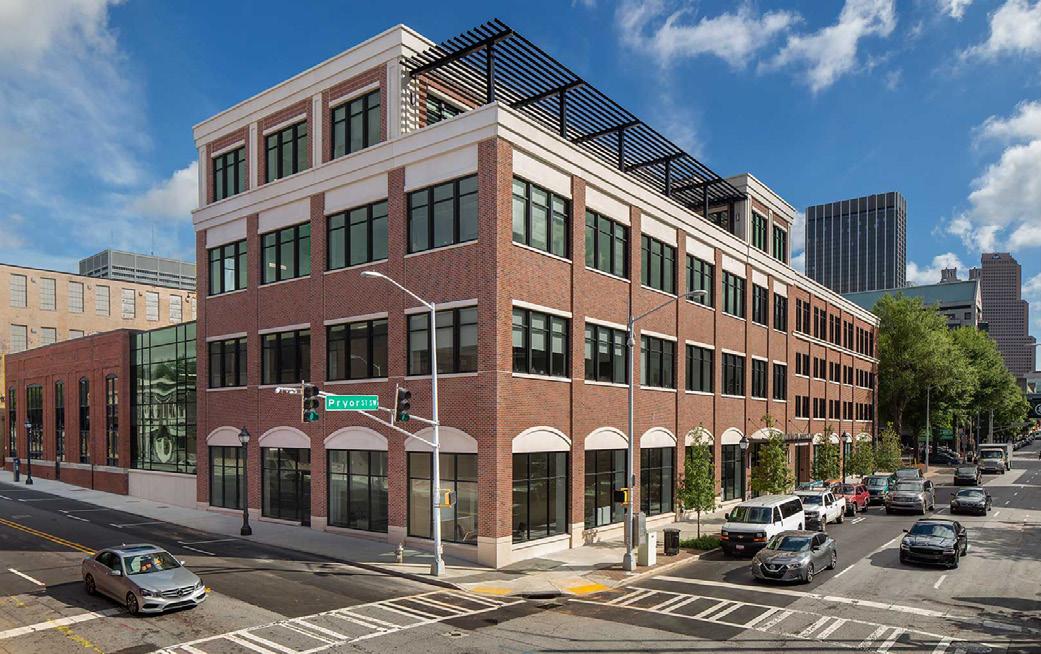


Shannon Wiggins, a first-time conference at tendee, had a lot of takeaways from the con ference and plans to attend next year.
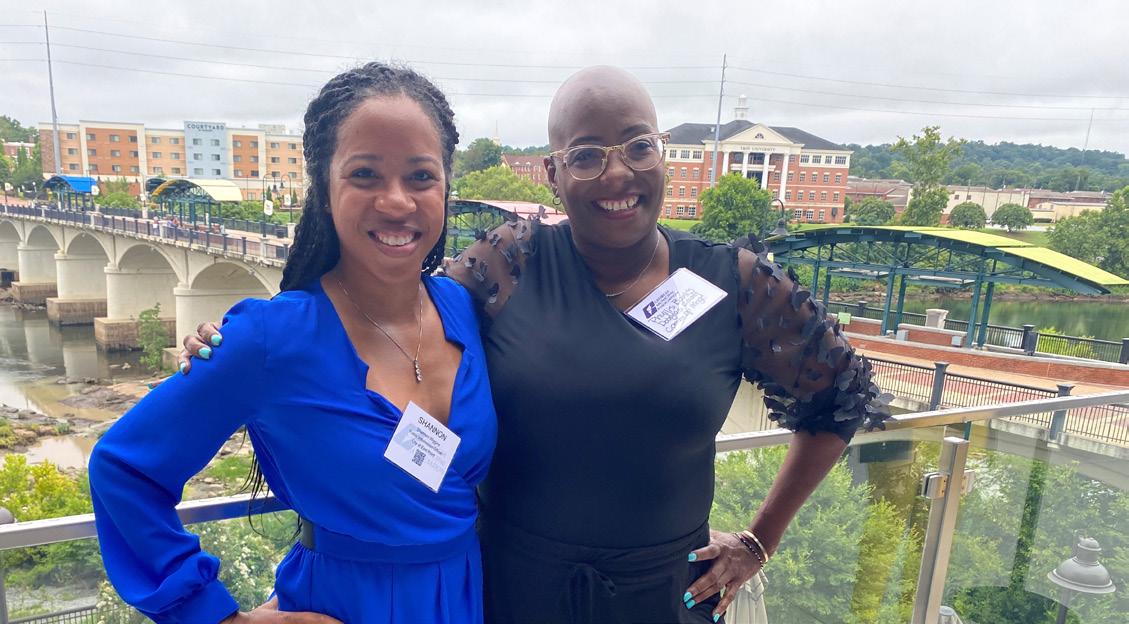
“I now feel more equipped with the tools and knowledge needed to implement strong communication strategies when a crisis oc curs,” she said. “It was also a great network ing opportunity to connect and learn from other government communicators and share ideas on how to communicate with our resi dents effectively.”
Dunwoody Communications Director Jennifer Boettcher, a first-time attendee, said she enjoyed the conference.
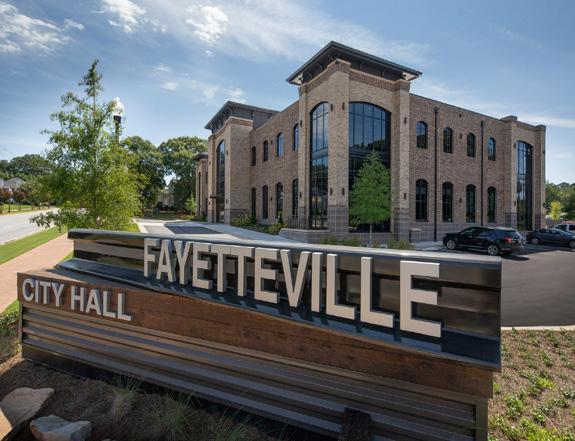
“I learned a lot and made great new con nections,” she said.
Georgia communicators interested in joining the group should join GMA’s Georgia Government Communicators Communities.
Contact Amanda Coyne at acoyne@gacities.com for more information.
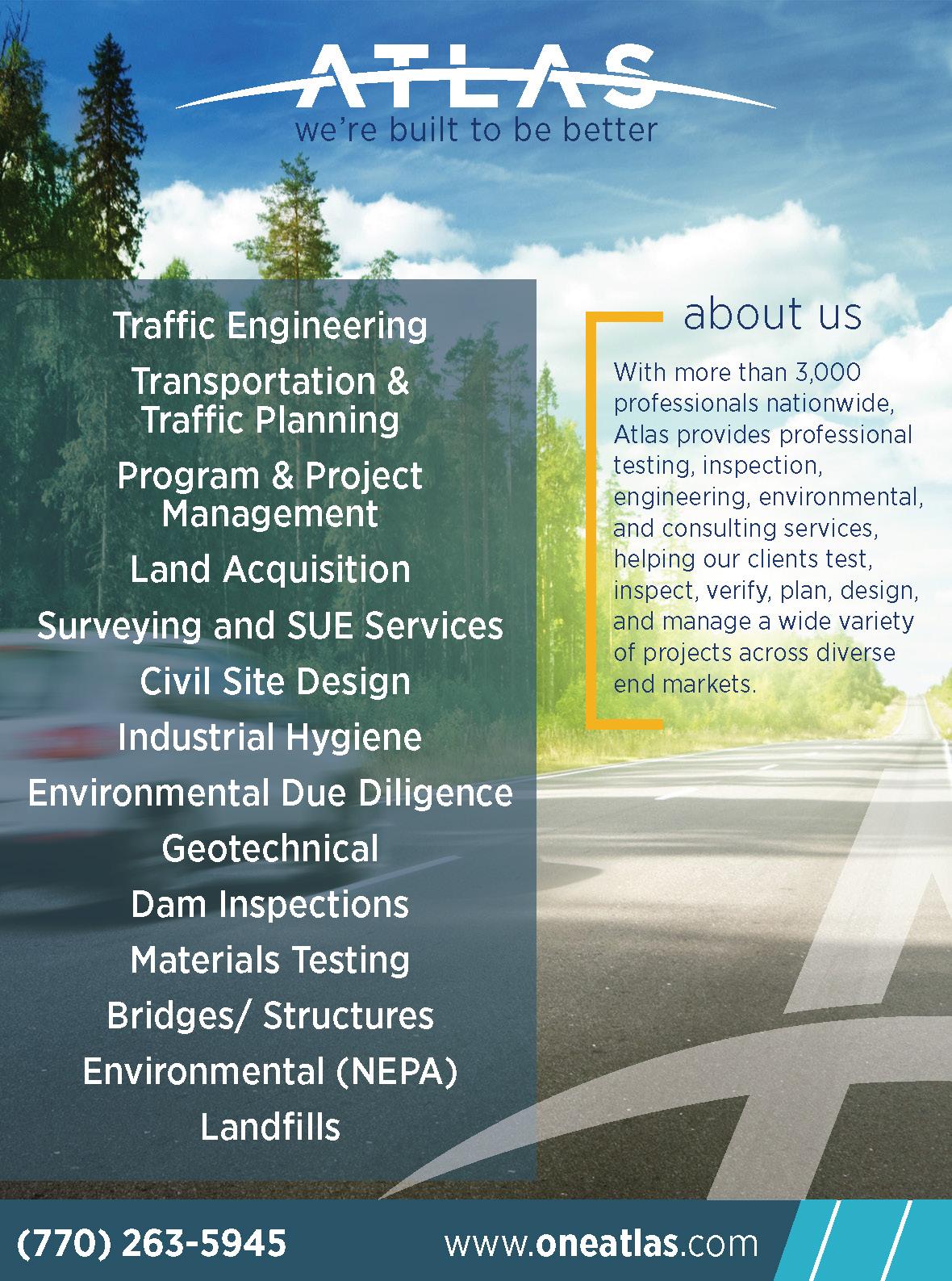 Georgia Municipal Association | New Headquarters, Renovation, and Parking Deck
City of Fayetteville | City Hall
City of Milton | Public Safety Complex
Georgia Municipal Association | New Headquarters, Renovation, and Parking Deck
City of Fayetteville | City Hall
City of Milton | Public Safety Complex
2023 Newly Elected Officials Institute Set For March
SAVE THE DATE
The 2023 Newly Elected Officials
Registration will open on gacities.com in October 2022.
In 1990, the Georgia General Assembly passed leg islation (O.C.G.A. 36-45-1) requiring all persons elected as members of a municipal governing authority who were not serving as members of a municipal governing authority to attend and satisfactorily complete a training program specifically designed for newly elected munic ipal officials.
The Georgia Municipal Association and the Univer sity of Georgia’s Carl Vinson Institute of Government are pleased to provide this required training to Georgia’s newly elected municipal officials.
The Newly Elected Officials Institute provides an opportunity for mayors and councilmembers to increase their knowledge and understanding of city government, especially as it relates to the role and responsibility of
Training
will be held March 1-3 at the University of Georgia Center for Continuing Education and Hotel in Athens.
the elected official. The training provides information designed to increase the awareness of the legal, finan cial and ethical responsibilities of city officials. Further, the course provides six hours of credit toward the vol untary training certificate program available through the Municipal Training Institute.
Municipal elected officials that have served before and have been reelected are required to take the Newly Elected Officials Institute again if they have been out of office for more than four years or more than one term, whichever is longer.
Visit the GMA website for registration details.
Newly Elected Officials Training Testimonials
Mayor Kurt Ward, Braselton:
“After cranking the Suburban, driving to Ath ens, and walking into a huge crowd full of excitement, I was reminded of many Saturday game day experiences - Go Dawgs! This one, however, was different. While all of these fans may not pull for the Georgia Bulldogs, every person feeling the undeni able excitement at this event cheers for the citizens of
the state of Georgia, especially those who live in our municipalities.
As a newly elected official, it was an honor and a privilege to join with hundreds of others that participat ed in GMA’s Newly Elected Officials Training in 2022.
When newly elected to office, ideas and initiative are easy. But leaders also need to always improve on implementation and perspective. The facilitators from
“
30
GMA and the Carl Vinson Institute provided a perfect balance of positive reinforcement and practical instruc tion. Also, the Newly Elected training created an or ganic environment for building relationships with other municipal leaders in Georgia.
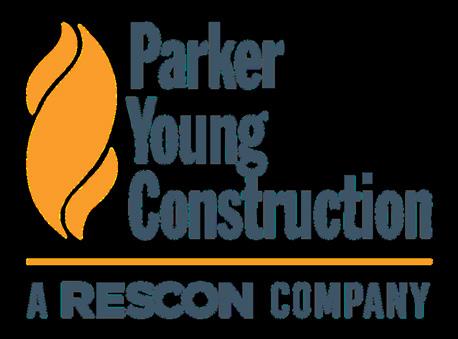
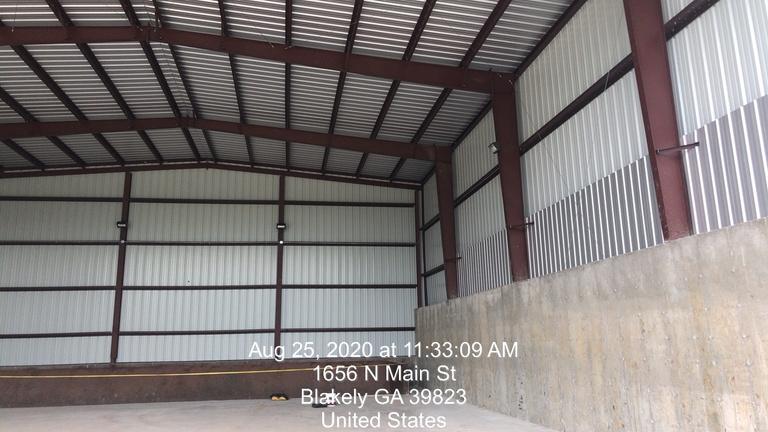
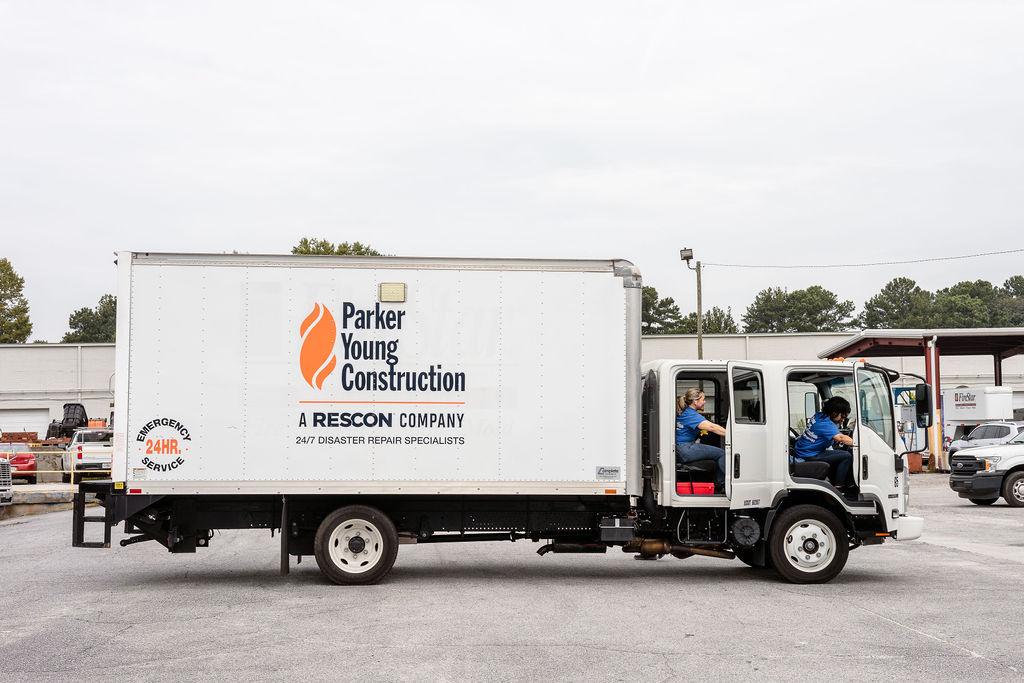
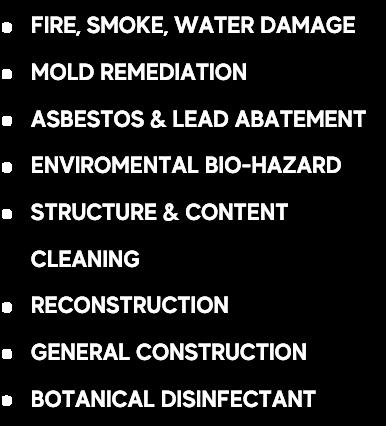
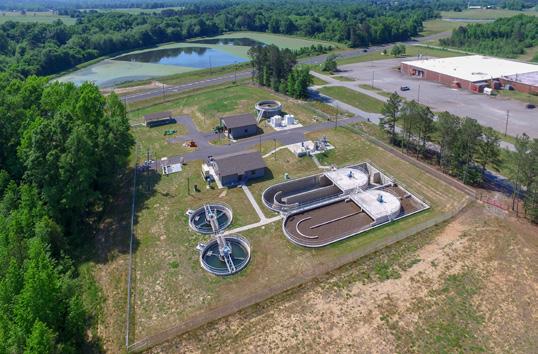



Thank you, GMA, for intentionally investing in newly elected officials in Georgia and for inspiring us to be our best for Georgia!”



Tara
Graves, Councilwoman, Stonecrest:
“Thank you for the Newly Elected Officials Training. The experience was amazing. This is a new arena for me, so attending the training gave me the op portunity to sharpen my knowledge while at the same
time building relationships. It is so important to build relationships to gain and share new ideas and best practices. The training also clarified the importance of the city charter and why it is the most important docu ment for the city and my role as a council member. I am still trying to read through our charter. Another import ant aspect of the training that was extremely important for me was zoning. Stonecrest is a relatively new city, so to ensure balance and proper land use that provide value to citizens that own property. Of course, in this position, we learn something new every day and are continually growing.
Thanks so much for your valuable training. I really enjoyed it and appreciated that you made it fun!”
Visit Us www parkeryoung com For More Information 770-368-1000 “
Pembroke’s Walraven Elected Municipal Training Board Chair
PEMBROKE MAYOR PRO TEM TIFFANY WALRAVEN, an at-large member of the training board since 2018, started her one-year term as Training Board Chair on July 1.
“I am honored and excited about serving as the chair of the Municipal Training Board,” Walraven said. “Over the next year, my goal is to increase awareness of training opportunities and the impact that training can have on cities across our great state.”
The Municipal Training Board provides oversight to the Harold F. Holtz Municipal Training Institute. The training institute is operated through a partnership be tween GMA and the University of Georgia’s Carl Vin son Institute of Government. The program offers more than 70 training classes designed for city officials.
Walraven has long encouraged municipal elected officials to participate in the training program as she and her fellow councilmembers have leveraged the knowledge gained in the training classes.
“Many times, we rely on staff within our municipal ities to bring about change and implement program ming,” she said. “However, we as mayors and city councilmembers have the ability and responsibility to bring new ideas and resources back to our cities that can help move us all forward.”
As the Training Board Chair, Walraven is now also a GMA Board of Directors member. As an elected official serving a small city — Pembroke has fewer than 2,900 residents — she brings a valuable perspective to both boards. Cities with fewer than 5,000 people comprise approximately 75% of GMA’s membership.
“The more than 1,100 training hours our council has earned has helped the city garner more than $29 million in funding over the past decade for projects that we would otherwise not have been able to afford,” she said. “As Training Board Chair, my ultimate goal is to help our fellow elected officials see the impact that they, too, can have on their cities.”
During her term as chair, Walraven will work closely with Pelham Mayor James Eubanks, who has been named Vice Chair of the training board.
32
GMA’s Municipal Training Board has new leadership.
2022 LEAN Conference Puts Priority on Preparedness
The Georgia Municipal Association and Association County Commissioners of Georgia’s Local Government Risk Management Services (LGRMS) group held their tenth annual Large Entity Annual Networking (LEAN) Conference Aug. 17-18 at the Hotel Indigo in Athens.
LAST HELD IN 2019, WITH THE TWO-YEAR PAUSE caused by the COVID-19 pandemic, this conference was much anticipated by attendees and LGRMS staff. The theme for the 2022 conference was “Local Government Readiness: Preparing for the Known and the Unknown.” LGRMS staff had a full lineup of guest speakers and staff members to present on different as pects of risk management, including:
• Charity D. Clark, CWCP, Director of Forsyth County Employment Services, who spoke on commitment, discipline, participation, and planning
• Bruce Ure, Retired Deputy, Seguin (Texas) Police Department, who was at the Las Vegas shooting and spoke on what he saw and what he learned
• Sarah Huffman, Risk Manager for the city of Rome, who spoke on DOT’s new regulations on CDL drivers
• Kate Collyer, Samsara’s Insurance Program Man ager, who spoke on using technology to improve employee’s driving

• Teaa Alston-Bing, Human Resources Director, Douglasville, who presented Upskilling 101: Op portunities and Risks
• Candace Amos, LGRMS Health Promotions Ser vices Representative who spoke on Emotional Intelligence
In addition to the guest speakers, attendees also en joyed roundtable discussions, team building activities, a group dinner and a morning health walk. Seventeen counties and 16 cities were represented at this event. Local Government Risk Management Services (LGRMS) is a non-profit company created in 1988 to provide risk control services for the Association Coun ty Commissioners of Georgia and the Georgia Munic ipal Association self-insurance pools. LGRMS assists local government members in the control of workers’ compensation, property & liability, and health insur ance risks. LGRMS is the first line professional resource for promoting, safety, loss reduction and wellness for Georgia local governments. Their mission, through education, training and consulting is to save lives, re duce injuries and loss of property for the benefit of em ployees, citizens and taxpayers.
For more information visit their website at www.lgrms.com and to become a member, contact your member services consultant for your district.
September/October 2022 | gacities.com 33
The Importance of a Hometown Connection
It’s not a novel idea that at times, legislators can be uninformed on issues. Just this past session, more than 4,000 pieces of legislation were in circulation under the Gold Dome, and hundreds were heard and voted on by committees.
TO HAVE AN UNDERSTANDING OF
THE
NUANCES and particulars of each bill would be next to impossi ble — so how could we blame them?

We can’t, but we can blame ourselves. The GMA advocacy team works tirelessly to keep city officials
and legislators informed on legislation under the gold dome that is pertinent to cities during the session. But it could be said that what actions are taken outside of the legislative session, are far more important that the maneuvering we can conjure within.
34
Now is our time to prepare. In the 1972 film The God father, Don Corleone delivers the following to a man asking for his help, “Bonasera, we’ve known each other for years, but this is the first time you come to me for help. I don’t remember the last time you invited me to your house for coffee...even though our wives are friends.”
Lobbying under the gold dome isn’t as treacherous as navigating mob politics, but the Don’s message still rings true. We don’t have to wait until the eleventh hour to be asking of our legis lators. We can build those relationships now and call upon them later.
Come November, the state legislature is poised to see significant turnover. Several current legislators have chosen to retire or seek higher office, lost in a primary or are facing a No vember challenger. Some state representatives and senators you may have known for years could be soon replaced. To add an increased layer of complexity, the 2022 elections are taking place under redrawn district maps. Representatives and senators who were previ ously outside your city’s boundaries may now repre sent portions of your municipality.
Legislators need a thorough understanding of the opportunities and challenges cities face daily. Too many legislators do not have a level of experience in or appreciation for city government that would enable them to take a more practical perspective on issues
including design standard preemption, unfunded mandates and the redirection of dedicated funds into the state’s general fund.

In recent legislative sessions, we’ve learned that too many legislators don’t know enough about the work city officials do and the hard choices they must make every day. GMA’s Hometown Connection pro gram is a way for city officials to remedy this problem. The program provides a framework that allows you to invite legislators to your city to show them what is go ing on in your community and to talk about the chal lenges and opportunities you and your citizens face.
The Hometown Con nection is based on the sim ple premise that the relation ship between city officials and legislators is vital to cit ies and to the advancement of Georgia.
GMA’s legislative team is available to assist you in your efforts. Please consider holding a Hometown Connection between now and December, and tell your member services district consultant if you de cide to plan one. If invited, we guarantee GMA will be there.
Legislative Outreach Associate Noah Roenitz at nroenitz@gacities.com or 470-734-7182.
September/October 2022 | gacities.com 35
If you need some help or guidance in setting one up, contact
We don’t have to wait until the eleventh hour to be asking of our legislators. We can build those relationships now and call upon them later.
Connect with GMA at Fall District Meetings
GMA leaders have begun a statewide journey to meet with local leaders in all 12 member services districts.
AT THESE MEETINGS, YOU’LL GET AN UPDATE ON GMA’s work and be able to ask questions, suggest ideas and talk face-to-face with association leaders. District meetings are a great way to become more involved in GMA, meet other local leaders in your area and ensure your city is getting the most out of its GMA member ship. GMA Executive Director and CEO Larry Hanson, President Julie Smith and various members of GMA staff will be present at these meetings, and they’re all look ing forward to seeing and hearing from you.
Districts 2, 3, 4 and 7 will already have met as of this magazine’s publication. The remaining meeting sched ule is below:
District 6: Thursday, Oct. 6, 11:30 a.m. - 1 p.m., Georgia Sports Hall of Fame, 301 Cherry Street, Macon
District 5: Wednesday, Oct. 19, 6 - 7:30 p.m., When Pigs Fly BBQ, 118 N. Wayne Street, Monroe
District 11: Thursday, Oct. 20, 6 - 7:30 p.m, Senior Center Multipurpose Room, 315 W. 2nd Street, Tifton
District 10: Tuesday, Oct. 25, 11:30 a.m. - 1 p.m., Camilla Depot, 212 East Broad Street, Camilla
District 1: Thursday, Oct. 27, 6 - 7:30 p.m., Calhoun Depot, 109 S. King Street, Calhoun
District 12: Monday, Oct. 31, 11:30 a.m. - 1 p.m., Cher okee Rose Country Club, 225 Cherokee Trail, Hinesville
District 9: Wednesday, Nov. 9, 6 - 7:30 p.m., Vidalia Community Center, 107 Old Airport Road, Vidalia
District 8: Tuesday, Nov. 15, 11:30 a.m. - 1 p.m., Flint EMC, 3 S. Macon Street, Reynolds
If you cannot attend your own district’s meeting, you are welcome at another one. If you have any questions, contact your member services consultant or Director of Member Services Pam Helton (phelton@gacities.com).
GMA fall district meetings are currently underway across the state through November.
Participants will hear a preview of the 2023 Georgia legislative session from GMA’s government relations team; learn about GMA programs, services and train ing; and get an update on the American Rescue Plan Act and opportunities through the federal Bipartisan Infrastructure Law. The meeting is also a great opportu nity for networking and peer learning, as participants will gain knowledge from cities in attendance about how ARPA funds are being invested around the district; as well as a “city showcase” focusing on exciting new initiatives and programs taking place in the district.
36
“District meetings are a time for cities to share ideas and bring them back to their commu nity. You always hear about new things that you can be doing better in your community.” - MAYOR
TERRY BRANCH, CLAXTON
“The District Meetings are fun and conve nient. At these meetings, council members network with leaders from neighboring cit ies to share ideas. We always gain so much from GMA staff briefings on state legislative issues.” - RICHARD NEWBERN, CITY MANAGER, COCHRAN
“Every city should attend GMA’s district meetings. This is a time for cities to come together, share ideas, and implement new initiatives in their communities.” - MAYOR MARY
PARHAM-COPELAN, MILLEDGEVILLE
We hope you can join us for a great meal, networking and sharing of new ideas and initiatives this fall. There’s no cost to attend, but to help plan for the meal, attend ees are asked to preregister on GMA’s website.
September/October 2022 | gacities.com 37
“ “ “
Talk it Up Thursday
GMA’s Talk it Up Thursday webinar series has become a staple for many members since its beginning in 2020.
TALK IT UP THURSDAY FEATURES LEADERS AND innovators in various sectors offering useful information and lessons – and it’s all free! Georgia’s Cities caught up with Director of Member Services Pam Helton to learn more about this webinar series.

GEORGIA’S CITIES: How and when did the Talk it Up Thursday series start?
PAM HELTON: When the member services team was ex panded to 7 members in 2020, we wanted to reach our members thru a virtual platform during the pandemic.
GC: What are some interesting topics and guests that have been featured in Talk it Up Thursday webi nars in the past?
PH: We have covered topics in a variety of areas, such as redistricting, solar power energy, downtown develop ment, vehicle and equipment asset management and many other topics which can be found at gacities.com/ Events/Talk-It-Up-Thursdays.
GC: How are topics and guests chosen?
PH: Usually, when we have requests from our members, or there is a report or grant that’s available, we will have
a topic that will answer questions and help our mem bers understand the topic in more detail.
GC: What do participants get out of these webinars?
PH: Lots of valuable information in municipal opera tions, compliance issues, tools and resources to assist in creating a more effective and efficient government.
GC: What is a topic or guest coming up in the near future that you’re particularly excited about?
PH: Since some of our cities have an election in Novem ber, we will be offering an “Onboarding New Elected Officials” session. This will give cities a better under standing of what needs to take place to educate new officials on their roles and responsibilities and a general overview of city operations. Orientation is key to any city’s new hire process.
GC: How can GMA members ensure they are aware of each month’s Talk it Up Thursday information?
PH: Visit our website at to view upcoming and past re corded session. Register for the upcoming sessions on the GMA calendar of events.
38
THE GMA CARES COMMITTEE IS KICKING OFF its annual season of giving back. Throughout the next few months, we will be focusing on several core ar eas: childhood literacy, food insecurities, wellbeing, and homelessness. We will connect with some of the Atlanta Metro areas most philanthropic organizations to tackle these specific issues in our communities. The opportunities range from packing pantry boxes, pre paring healing meals, educational equity, to mental health and wellbeing.
In September, GMA CARES Committee mem bers participated in the Kaiser Permanente Run, Walk and Roll in Atlanta’s Piedmont Park. This event was designed to promote fitness and provide an oppor tunity for coworkers to bond and spend time togeth er off the clock. The CARES Committee also partic ipated in Urban Recipe Pack and Prep at the end of
September. GMA staff worked together to prepare packaged meals and food for Atlanta residents in need.
Upcoming GMA CARES events include:
• Peace on the Move Community Food Pantry, Thursday, Oct. 6, 9 – 11 a.m.
• Urban Recipe: Pack & Prep, Wednesday, Oct. 19, 2 – 4 p.m.
If you are interested in becoming a Cares Committee member or giving back at either of these events, please reach out to Lucretia Leigh (lleigh@gacities.com) or Sherea Robinson (srobinson@gacities.com) for more information.
NOW IS THE TIME TO SERVE! HELP YOURSELF WHILE HELPING OTHERS!
Volunteering has enormous benefits to you and your community. Time is precious and scarce in this busy world, but committing a portion of your time to volunteering is one of the best ways to meet fellow coworkers and new friends, advance your social skills and increase self-esteem and life satisfaction. Volunteering is good for your mind, body and spirit.
• BOOST SELF-CONFIDENCE - Doing good for others can make you feel better about yourself and give you a sense of pride.
• REDUCE RISK OF DEPRESSION - Volunteering reduces your risk of depression by keeping you in contact with others and building up your social support.
• ADVANCE YOUR CAREER - Experience a new field, build upon skills you already have, a brilliant way to get life experience while positive ly impacting others.
• ESCAPE THE EVERYDAY MUNDANE - Finding new interests and hobbies through volunteering can be fun and fulfilling. Escape your everyday routine and create balance in your life.
• MEET NEW PEOPLE - Expose yourself to people with common in terests, expose yourself to a diverse population of people and make more friends and contacts.
• IMPROVED IMMUNITY– Research shows by cultivating an attitude of gratitude and giving we can improve our state of well-being. September/October 2022 | gacities.com 39
GMA Workshops Lay Out Budgeting Process
One
RECENTLY, GMA STAFF FACILITATED A BUDGET workshop for Augusta-Richmond County. This was the second year that GMA worked with Augusta’s may or, commission and staff to set their priorities for the coming budget cycle. In preparation of the workshop, GMA staff met with all department supervisors one-onone to go over their previous year’s work plan and to access their needs for the coming year. The information gained was relayed to the mayor and commission to use as part of the budget workshop.
The one-day workshop was held on Aug. 3 at the Augusta Museum of History. The theme for this year’s workshop was “Mission Possible,” a theme that Inter im Administrator Takiyah Douse created to set the tone for the coming year. The budget workshop was broken into various sections to include an overview of the his torical data of revenues, expenses, and fund balance
over the past ten years, an economic outlook report, a review of revenue projections for the coming five years, and finally setting the goals and priorities of the Augusta Commission. These workshops are created to be interactive, and GMA encouraged open dialogue among the elected officials as well as the city officials in attendance. Through group activities, moderated dis cussions, and guidance from GMA staff, Augusta-Rich mond County was able to establish specific and mea surable goals for their 2023 budget cycle.
If your city would like to host a workshop or training event, reach out to your member services consultant for your district. You can find a complete list of consul tation offerings on our website under “What We Do” and “Consultation Services.” GMA can also customize trainings to fit your city’s needs.

of the services that GMA offers is facilitation of workshops and retreats for member cities.
40



Member FINRA & SIPC crewsfs.com When it comes to water and wastewater financing – for upgrades, savings, expansions and more – we are your go-to resource. Contact Tony King and see what Crews can do for you. Tony King 404.992.0707 tking@crewsfs.com KEEP YOUR PROJECTS FLOWING SMOOTHLY. MARK YOUR CALENDARS! It’s almost time for action to begin again under the Gold Dome. You know what that means – GMA’s Cities United Summit! For four days in January, elected officials, city staff and special guests will have access to advocacy tools, policy committee meetings and unrivaled training and networking opportunities. WHEN: Jan. 20-23, 2023 WHERE: Hilton Atlanta Downtown Hotel REGISTRATION OPENS: Nov. 14, 2022 We hope to see you in Atlanta in January to show the legislature we are all cities united!
Cities Create Community Through Placemaking
BY NIKKI PERRY
THE ECONOMIC PLACEMAKING COLLABORATIVE GUIDES CITIES IN THE USE OF CREATIVE DESIGN TO SOLVE TYPICAL MUNICIPAL PROBLEMS.
EVERY PLACEMAKING PROJECT BEGINS WITH some sort of issue: How can we improve pedestrian safety on this street? How can we discourage illegal parking downtown? How can we attract people to these businesses? The creative process of placemak ing unearths more questions: What unmet needs exist in the community? What are ways that people can in teract in and with this space? How can we use it to tell our city’s untold stories?
The newest members of the Georgia Econom ic Placemaking Collaborative will spend this fall an swering these types of questions. Adel, Clarkston and Thomasville have formed community teams to engage in education, visioning and planning

community-building spaces. The 2021 class—Coving ton, Fitzgerald, Jackson, Powder Springs, Young Harris and Meriwether County—will complete the two-year program with project development, funding, imple mentation and impact analysis.
The program is a collaborative effort of public and private organizations in the individual commu nities as well as throughout the state. Georgia Cities Foundation administers the program, with support from Georgia Municipal Association, Georgia Power, Electric Cities of Georgia, UGA’s Carl Vinson Institute of Government, the Georgia Department of Commu nity Affairs, Georgia Conservancy and Georgia City Solutions.
42
Each community team consists of elected officials, city staff, members of downtown development organiza tions, chambers of commerce, faith-based organiza tions, local associations, business owners/operators and residents. Teams meet in a retreat setting to learn the basic principles of placemaking and get their cre ative juices flowing. Then each community team is matched with a facilitator, who expertly guides them through the process of turning ideas into reality.
At its core, the program is collaborative. Commu nity engagement is the most important component of a truly impactful placemaking project, said program facilitator Leigh Askew Elkins, a Senior Public Service Associate with the Carl Vinson Institute.
“First is community engagement – with just about any project that I do in a community, I come to the proj ect with the belief and recognition that those who live in a place know what is best for that place. So, having people engaged and involved is, to me, the key ingre dient,” Elkins said.
Placemaking should be a ground-up movement, said Charles Ewert, Principal Planner for Weber County Corporation in Utah, during the open plenary session in May. If the project is to be successful, all the affected stakeholders should be represented on the communi ty team, including naysayers.
“There is something in common that everybody has. Focusing on commonalities, focusing on things that you can do, as opposed to the things that people don’t want you to do or you can’t do, is going to get you to a better future,” Ewert said.
Creating interaction within a space is another key component of a successful placemaking project.
“Second, an impactful placemaking project should be an active project, and by that, I mean, creating or enhancing a space where you interact and engage in a way that reflects and builds community,” Elkins said.
The city of Gainesville participated in the pilot pro gram launched in 2018. Assistant City Manager Ange la Sheppard said the city’s team started out with a spe cific project in mind but left with an expanded vision of placemaking possibilities.
“It really gave us a different way to look at projects and some ideas and goals to shoot for,” Sheppard said.
“We have several projects in the works, and we have taken what we have learned from placemaking and are thinking about how we apply it to these proj ects,” she said.
The Gainesville team is applying that knowledge to existing and upcoming projects, including down town alleys, a plaza attached to new downtown park ing deck, and the Highlands to Islands Trail extension through downtown.
The benefits of the program extend well beyond the resulting projects. Elkins said a renewed, collabo rative focus on community-building is so valuable.
“Placemaking provides a structure to really think about your community, ways to actively and creatively engage your residents, and to create positive econom ic opportunities. Stepping back, thinking about the assets that you have, what they say about the place, the community, and how those assets might provide opportunities that haven’t been considered before is important to building community,” Elkins said.
New this year, grant funding is available to alumni cities for implementation of placemaking projects.
“In partnership with Georgia Power, we are now able to provide grants for our GEPC cities,” program administrator Sadie Krawcyzk said.
Applications are now being accepted for the 2023 cohort of the Georgia Economic Placemaking Collab orative, which is limited to three cities. Visit georgiac itiesfoundation.org to apply.

HOW TO APPLY
Georgia Economic Placemaking Collaborative georgiacitiesfoundation.org
Oct. 31: Letter of intent due Dec. 2: Application due Dec. 30: Accepted applicants notified
September/October 2022 | gacities.com 43
Supreme Court Ruling Sides With Sovereign Immunity
Decision Allows Cities to Purchase Higher Coverage Limits
BEFORE 2005, GEORGIA LAW DID NOT REQUIRE municipalities to insure the city’s motor vehicles. If a city chose to purchase automobile liability insurance, it waived sovereign immunity up to the limits of the applicable policy. This created a public policy issue because cities that opted not to purchase insurance would receive the full protection of sovereign immu nity, and an injured party would have no recourse to collect damages. Cities that demonstrated more finan cial responsibility by purchasing insurance were seem ingly punished. In response, the General Assembly
amended O.C.G.A. § 33-24-51 and enacted O.C.G.A. § 36-92-2.
O.C.G.A. § 36-92-2 provides limited waivers of sovereign immunity with various dollar limits based on the number of persons injured and the date when the accident occurred regardless of whether a city (or county) purchased automobile liability insurance. The waiver amounts were graduated over time, topping out at $500,000 per person, $700,000 per accident and $50,000 for destruction of property per accident for all accidents occurring on or after Jan. 1, 2008.
TOWNS & THE LAW
44
Further, O.C.G.A. § 36-92-2(d) provides the waiver in creases to the extent that a city is covered by a policy that exceeds the statutory waiver amount. For exam ple, if a city carried a liability limit of $1 million immuni ty was waived to this higher amount. Most insurance policies cities purchase have limits that exceed the statutory waiver amount.
Until the Supreme Court of Georgia’s recent ruling in Atlantic Specialty Insurance Company v. City of Col lege Park, 313 Ga. 294 (2022), it was unclear whether a city could retain its sovereign immunity at the statuto ry levels of $500,000, $700,000 and $50,000 by purchasing an automobile liability policy that excluded coverage above the amounts of the statutory waiver found in O.C.G.A. § 36-92-2. In that case, the city of College Park purchased automobile liability policies with limits of $5 million. Significantly, the pol icies contained additional provisions, also known as endorsements, that attempted to retain the city’s sov ereign immunity by contract.
that the city purchased does not cover claims for dam ages to which the defenses of sovereign and govern mental immunity do apply.” (emphasis in original). Accordingly, the court enforced the “bargained-for policy limits” and limited the city’s waiver of immunity to the $700,000 contained in O.C.G.A. § 36-92-2.
Can a municipality retain its sovereign immunity by purchasing insurance policies that exclude cov erage of claims for which sovereign immunity would apply? The answer was a resounding yes
In this decision, Georgia’s highest court finally an swered a question long left unanswered by Georgia law: Can a municipality retain its sovereign immunity by purchasing insurance policies that exclude cov erage of claims for which sovereign immunity would apply? The answer was a re sounding yes. The court based its ruling on a prior ruling of the Georgia Court of Appeals and expanded that decision even further to include automobile policies. The impact of the de cision is far reaching. Cities will now be able to purchase higher limits of coverage in automobile and non-automobile insurance policies without fear that this would waive the city’s sovereign immunity.
In Atlantic, three people were tragically killed by a driver who was being pursued by a College Park police officer. In the wrongful death case against the city, the city asserted sovereign immunity as a defense — seeking to limit the waiver of sovereign immunity to $700,000 contained in O.C.G.A. § 36-92-2. The trial court and the Georgia Court of Appeals refused to ap ply the endorsements in the policy, resulting in a waiv er of the city’s immunity in the amount of $5 million.
In a unanimous decision, the Georgia Supreme Court ultimately held that the immunity endorsements were enforceable, and the plaintiffs’ recovery was capped at $700,000 based on state law and the terms of the insurance policy. The court reasoned that “un der a plain reading of the endorsements, the insurance
GIRMA cities immediately reaped the benefit of the decision upon their May 1 renewal because GIRMA adopted an exclusion to apply the Atlantic precedent for the benefit of its Members. Cities that participate in the GIRMA program can avail themselves of the Atlan tic decision and will be able to retain sovereign immu nity to fullest extent available on state law claims and will only waive immunity in the amount of $500,000 per person, $700,000 per accident, and $50,000 for property damage claims per accident. This will allow cities to carry higher limits on claims for which sover eign immunity is not available (such as federal claims and nuisance claims) without sacrificing the defense of immunity on most state law claims.
September/October 2022 | gacities.com 45
Federal Collaboration Focuses on Rural Resource Access
In 2022, Georgia was selected as one of five states for a U.S. Department of Agriculture pilot program called the Rural Partners Network (RPN).
THE RURAL PARTNERS NETWORK INTRODUCES A new way of doing business: a collaboration among federal agencies meant to improve access to gov ernment resources, staffing and tools. Participating agencies designate key points of contact who focus specifically on rural strategies, improving visibility and attention to rural issues.
“The Biden-Harris Administration believes it is time to do more to help rural communities thrive,” said USDA Rural Development State Director Reggie Tay lor. “Through the Rural Partners Network, the Admin istration is marshaling the combined resources of fed eral agencies and other providers to help local people unlock the full potential of rural America.”
In Georgia, several counties, along with the cities of Fitzgerald and Twin City, are included in the pilot program. GMA stands ready to help USDA, Fitzger ald and Twin City to execute this program to its fullest potential. Municipal leagues and other organizations connecting local and federal governments are key in helping cities get the most benefit possible from these programs, RPN Executive Director Lee Jones said.
“GMA and other state organizations provide unique technical assistance, funding, and expertise with state-specific programs and requirements,” Jones said. “Their active collaboration with Community Networks and coordination with the Community Liai sons will be critical in building network capacity and in leveraging funding to address identified communi ty-driven and locally-led priorities.”
Georgia’s Cities talked to Taylor about this program and how it will affect communities in Georgia.
Georgia’s Cities: How were communities in Georgia selected to participate in the pilot program?
USDA Rural Development State Director Reggie Taylor: RPN Community Networks are selected based on data analysis, stakeholder input and direct commu nity conversations that show the interest, need, local engagement, collaboration and opportunity for addi tional support to advance community-driven strate gies. USDA begins by identifying distressed areas in counties of persistent poverty. Select communities are invited to submit letters of interest and sign a Memo of Understanding with the network where all parties agree to establish the critical capacities and strategies necessary to ensure that the network can successfully leverage economic recovery resources, generate in clusive and sustainable economic growth and diversi fication, and establish prosperity that is enjoyed by the entire community and its residents.
GC: How many staff (community liaisons) will be selected to provide support to local governments through the pilot?
RT: In Georgia, we will have four full-time staff dedi cated to RPN efforts: One liaison per Community Net work, plus a supervisor/statewide community planner dedicated to RPN.

FEDERAL FOCUS
46
GC: What are examples of the types of technical assistance that will be available to participating communities?
RT: The on-the-ground community liaisons will pro vide direct technical assistance to participating com munities and stakeholders. These federal employees will provide place-based guidance to help navigate federal programs, collaborate with federal staff in Washington, D.C., build relationships, help stakehold ers identify community-driven solutions, and develop successful applications for funding. The community liaisons will also help the networks navigate, identify and access a variety of federal and other programs that provide funding for planning and pre-development activities and other technical assistance, as well as programs that provide imple mentation capital. One of their main areas of focus is to support and build local capacity needed to plan and apply for capital for specific projects, including infrastructure, economic and business development, workforce, housing, broadband, renewable energy, community facilities, transportation, etc., depending on the priorities the communities decide to focus on.
GC: What resources will be launched in this first year of RPN?
RT: Resources created to support the RPN include:
• A Rural Prosperity Interagency Policy Council, co-led by USDA and the Domestic Policy Coun cil. There are 20 federal agencies and region al commissions participating in the council to align our respective programs their delivery. RPN staff are communicating to this group what they learn working on the ground about rural priorities, barriers to program access, and investment priorities to inform policy decisions moving forward.
• A council of Rural Desk Officers from more than 20 federal agencies that serve as the “frontdoor” to their respective agency, providing
insight and expertise on a variety of rural issues.
• The RURAL.gov website serves as a one-stop shop for information on federal programs and resources for rural communities and to share strategies that are working in commu nities across the nation. A new and improved RURAL.gov is scheduled to launch in early fall with funding opportunities, resources and in formation for rural community and economic development.
GC: Based on the success of the program, what are the long-term plans to institutionalize RPN?
RT: The network launched efforts with 14 rural commu nities, regions, or Native American Tribes in Arizona, Georgia, Kentucky, Mississippi and New Mexico in early 2022. The network is now working in Alaska, Ne vada, North Carolina, Puerto Rico, West Virginia and Wisconsin to identify additional Community Networks (2-3 per state or territory) to receive targeted federal staffing and technical assistance to address communi ty-identified needs. RPN plans to launch two or three additional groups of Community Networks each year. RPN will continue to work with philanthropic partners to identify creative ways the federal government and the philanthropic community can leverage resourc es to provide direct technical assistance and capaci ty-building services to rural communities. Facilitating these collaborations will foster long-term support and equitable access to underserved rural communities participating in RPN.
Learn More about RPN
The Rural Partners Network is led by USDA as an all-of-government program that will help rural com munities access resources and funding to create jobs, build infrastructure and support long-term economic stability on their own terms. More information is avail able at https://www.rural.gov/.

September/October 2022 | gacities.com 47
Fairs and Festivals

October 1
Oktoberfest Lawrenceville
Friendship Festival Social Circle
Crabapple Fest Milton Auburn Fest Auburn October 1-2
Georgia Marble Festival Jasper
October 1-9 Georgia State Fair Hampton
October 7
Georgia Mountain Fall Festival Hiawassee
October 7-9
Atlanta Pride Festival Atlanta
October 8
WaHa Music & Food Truck Festival Waverly Hall
Georgia Apple Festival Ellijay
150th Birthday Celebration / Culture & Spirit Festival Smyrna
October 14
Great Ogeechee Seafood Festival Richmond Hill
October 14-29 Ringgold Haunted Depot Ringgold
October 14-15
Calhoun Stockyard Pro Rodeo Calhoun
October 15
Braselton Zombie 5k Run Braselton
Find me at the Loganville Autumn Festival Loganville
Olde Town Fall Festival Conyers
Taste Brews Fall Fest Canton
Wings over North Georgia Rome
October 15-16
Gold Rush Days Festival Dahlonega
October 20
CPMSA Wine Stroll College Park October 21
Vintage Market Days Chickamauga
October 21-23
Braselton Antique & Artisan Festival Braselton
October 22 Gainesville Chicken Festival Gainesville
Isle of Hope Art and Music Festival Savannah
Inman Park Wine Stroll with Music and Art Atlanta
Boo at the Zoo Atlanta
The Great Pumpkin Fest Canton

Pumpkin Fest Fayetteville
October 28 Boo Fest Lawrenceville
CITYLITES 48
October 28-29
Rome River Jam 2022 Rome
October 29-30
Toccoa Harvest Festival Toccoa
October 29-30 Crafts & Drafts Smyrna
October 31
Trick or Treat on Main Street Watkinsville
Costume Parade Toccoa
November 5 Carnival in the Park Fayetteville
November 6
Suwanee Classic Car Show Suwanee
November 12
Bartow County Friends of the Library Arts & Crafts Fair Cartersville
Harvest Festival Lawrenceville
Annual Holiday Bazaar Bethlehem

November 19 Jingle Mingle & Lighting of the Chicken Gainesville

Celebrate the Holidays in Braselton Braselton
November 25 Annual Lighting of the Village Helen
November 26 Small Business Saturday Toccoa
Annual Tree Lighting/Holly Jolly Fest Dallas November 28
Light Up the City & Tree Trail College Park
December 1 Cravin’ Bacon Walk Braselton
December 2 Christmasfest & Lighting of the Tree Toccoa
December 3 Christmas Parade Toccoa
Christmas Cobbtown Style Cobbtown
Miracle on Main Street Fayetteville
December 4 Watkinsville Christmas Parade & Tree Lighting Watkinsville
Christmas on the Green Gainesville
December 10
Merry Little Christmas Lawrenceville

December 31 Silver Comet Ball Drop Dallas
To place a free Fairs & Festival listing contact gacities@gacities.com. Please submit listings at least eight to ten weeks ahead of publication date.
September/October 2022 | gacities.com 49
GEORGIA GEMS
MORGANTON POINT
WHETHER YOU SEEK A SERENE FISHING ESCAPE or a stand-up paddle board party, you can find it at Morganton Point Recreation Area located in the Blue Ridge District of the Chattahoochee National Forest.
Operated by FIND Outdoors under permit by the U.S. Forest Service, Morganton Point Recreation Area is the only developed campground on the shoreline of beautiful Blue Ridge Lake. This 3,200-acre reser voir offers 60 miles of shoreline and has been said to be one of Georgia’s most picturesque mountain lakes. Visitors can choose from over 40 campsites, many in cluding views of the lake, along with group camping and walk-in opportunities. RV camping options are also available.
“It has great picnic areas, the best place to watch a sunset, and a beautiful view of the mountains,” said Jode Mull, director of tourism services for Fannin Coun ty Chamber of Commerce & Visitors Bureau.
While at the recreation area, be sure to visit The Point. Located at the beach and just a short walk from the campground, you’ll find many items you might need for your day at the park, including snacks, sou venirs, fishing gear and more. The day use area also offers swimming, hiking trails and picnicking. Want
to rent a kayak while visiting the lake? The Point offers single, double and fishing kayak rentals. You can also bring your friends and enjoy the water by renting one of the unique party stand-up paddle boards!
Boating and fishing are also popular activities on Blue Ridge Lake. A boat launch featuring two ramps is conveniently located near the campground. Some of the fish that populate the lake include bluegill, large mouth bass, smallmouth bass, walleye and rainbow trout.
Several trail options are located just minutes away. The Aska Trail System provides approximately 16.5 miles of recreational trails for bicyclists and hikers. This area is located within a 30-minute drive from Morgan ton Point Recreation Area and less than 10 miles from downtown Blue Ridge.
Whether considering a day trip or a multi-day camping adventure, Morganton Point Recreation Area is worth checking out.
Morganton Point Recreation Area is located at 475 Lake Dr., Morganton, GA. For more information, call 877-444-6777 or visit https://gofindoutdoors.org/ morganton-point/.

50
2022 BUSINESS ALLIANCE PROGRAM PARTICIPATING ORGANIZATIONS
PLATINUM
GOLD
SILVER
Aetna
Alston & Bird
ATLAS
AVR
Bates Carter
Black Mountain Software
Calix
Charles Abbott Associates
Charter Communications



Comcast Business
Comprehensive Program Services

CPL
Crews & Associates, Inc.
Davenport Public Finance

Elarbee Thompson
Engineering Management, Inc. EOM
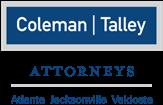
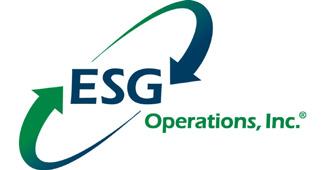
Falcon Design Consultants
Freeman Mathis & Gary, LLP
Gallagher Bassett Gas Authority Georgia 811
Georgia Transmission GFL Environmental Inc GMC
Google Fiber Government Window Gray, Rust, St. Amand, Moffett & Brieske
Hunton Andrews Kurth Ingevity
IPG, INCORPORATED
IUC - Interactive Utility Communications Jacobs Linkscape 360
Manley Spangler Smith Architects, P.C. McGuireWoods Consulting LLC McKinstry

Mercer Group Associates
Municipal Revenue Services
Murray Barnes Finister, LLP
Nichols, Cauley & Associates
Parker Young Construction, Inc.
NONPROFIT
American Heart Association
Central Savannah River Area Regional Commission

Fox Theatre Georgia Equality
Georgia Manufactured Housing


Association
Georgia Mountains Regional Commission
Georgia Public Web
Georgia Restaurant Association
Heart of Georgia Altamaha Regional Commission

MEAG Power
Metro Atlanta Chamber of Commerce
Middle Georgia Regional Commission
Northeast Georgia Regional Commission
Northwest Georgia Regional Commission
Paya




Pieper O’Brien Herr Architects

Precision Planning, Inc. Republic Services, Inc. Rindt Rushton Stifel
Still Waters Engineering Strategic Materials, Inc. Strongside Solutions SUEZ
The Coca-Cola United Bottling Company Thomson Reuters United States Department of Agriculture
Southern Georgia Regional Commission
Southwest Georgia Regional Commission
The Brick Industry Association
Three Rivers Regional Commission
201 Pryor Street, SW Atlanta, Georgia 30303

STD U.S. POSTAGE PAID ATLANTA,
PERMIT NO. 1959
PRSRT
GA
Moultrie was named the Georgia Downtown Association Downtown of the Year at the organization’s August conference. Moultrie also won an award for their annual celebration “Lights! Lights! Thanksgiving Night.”
Page 5



















































 Georgia Municipal Association | New Headquarters, Renovation, and Parking Deck
City of Fayetteville | City Hall
City of Milton | Public Safety Complex
Georgia Municipal Association | New Headquarters, Renovation, and Parking Deck
City of Fayetteville | City Hall
City of Milton | Public Safety Complex













































